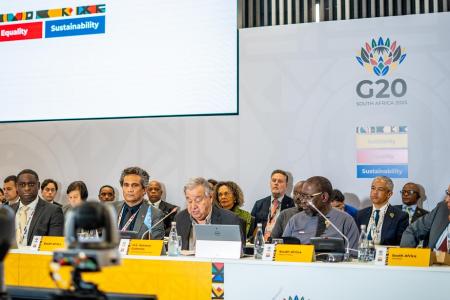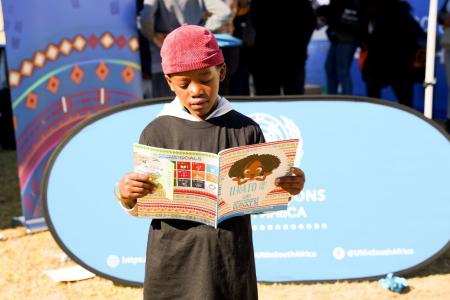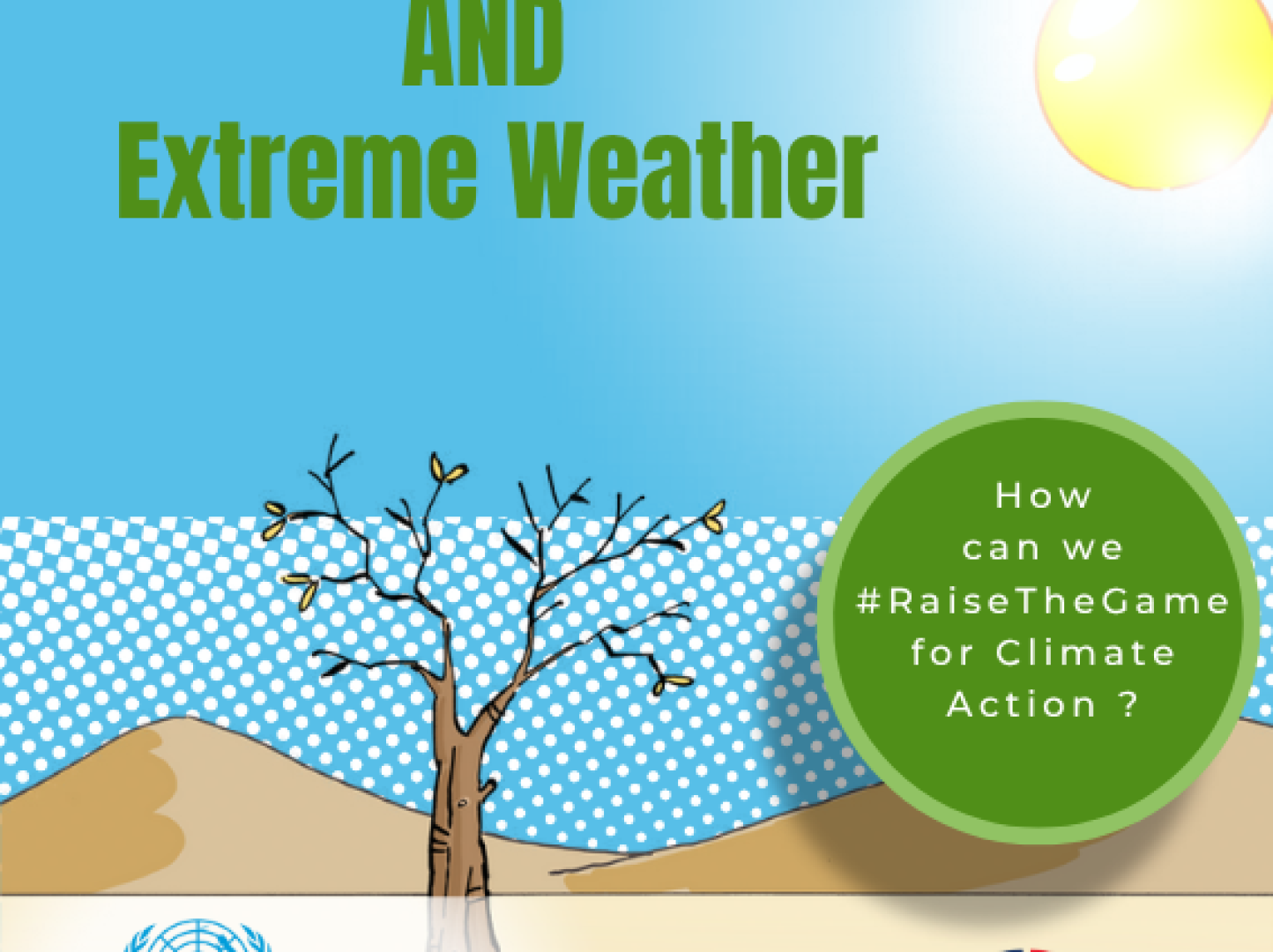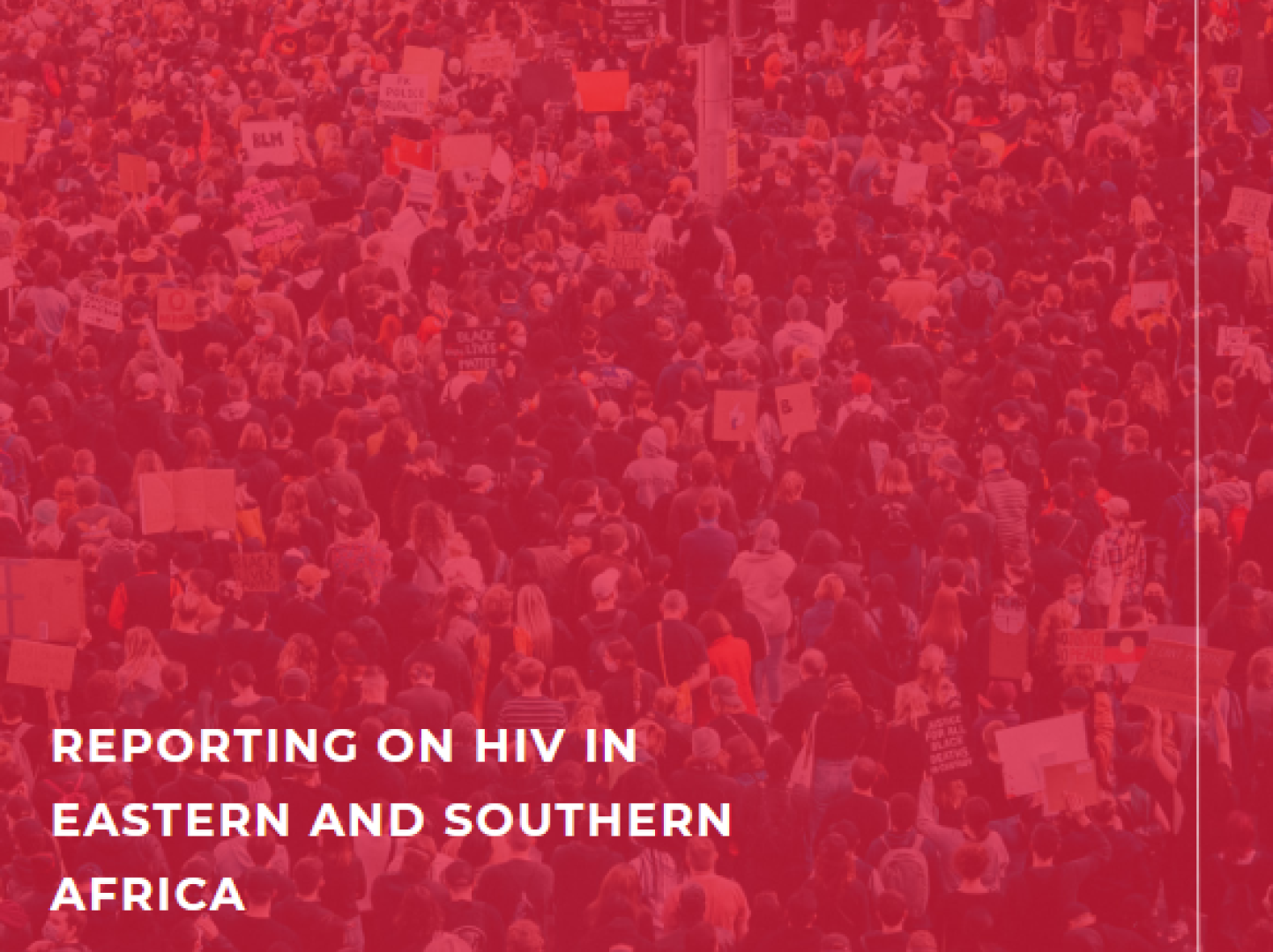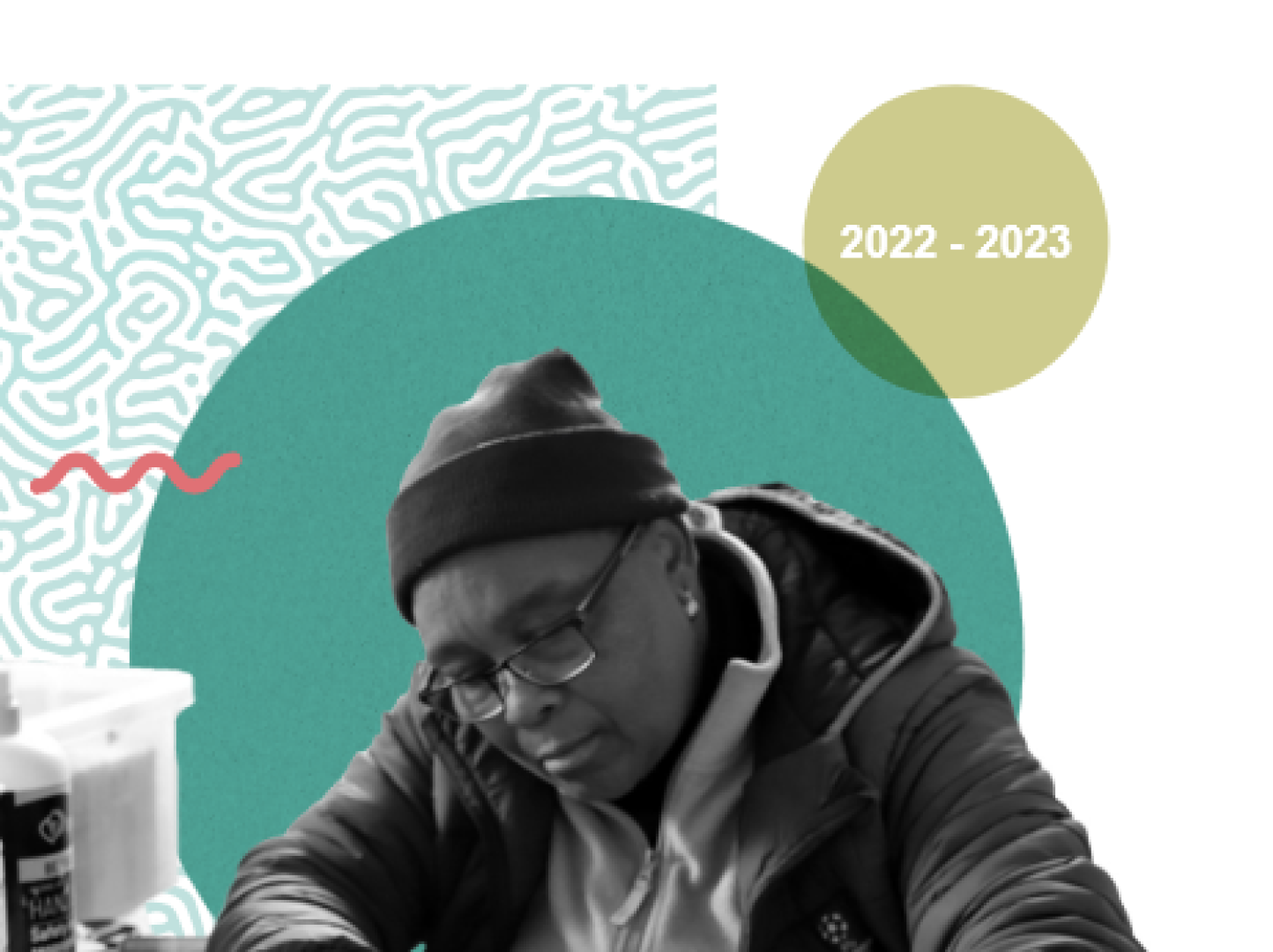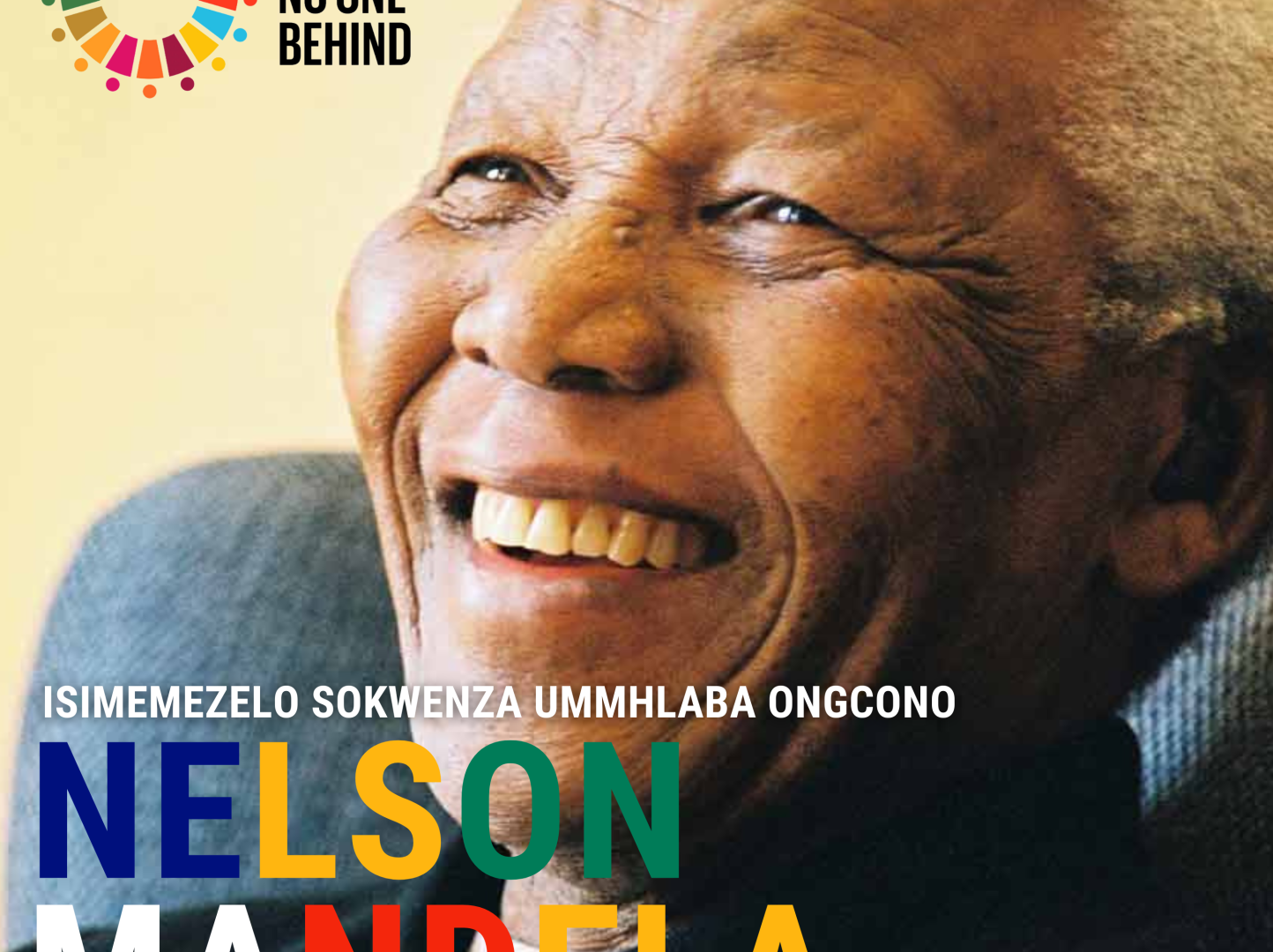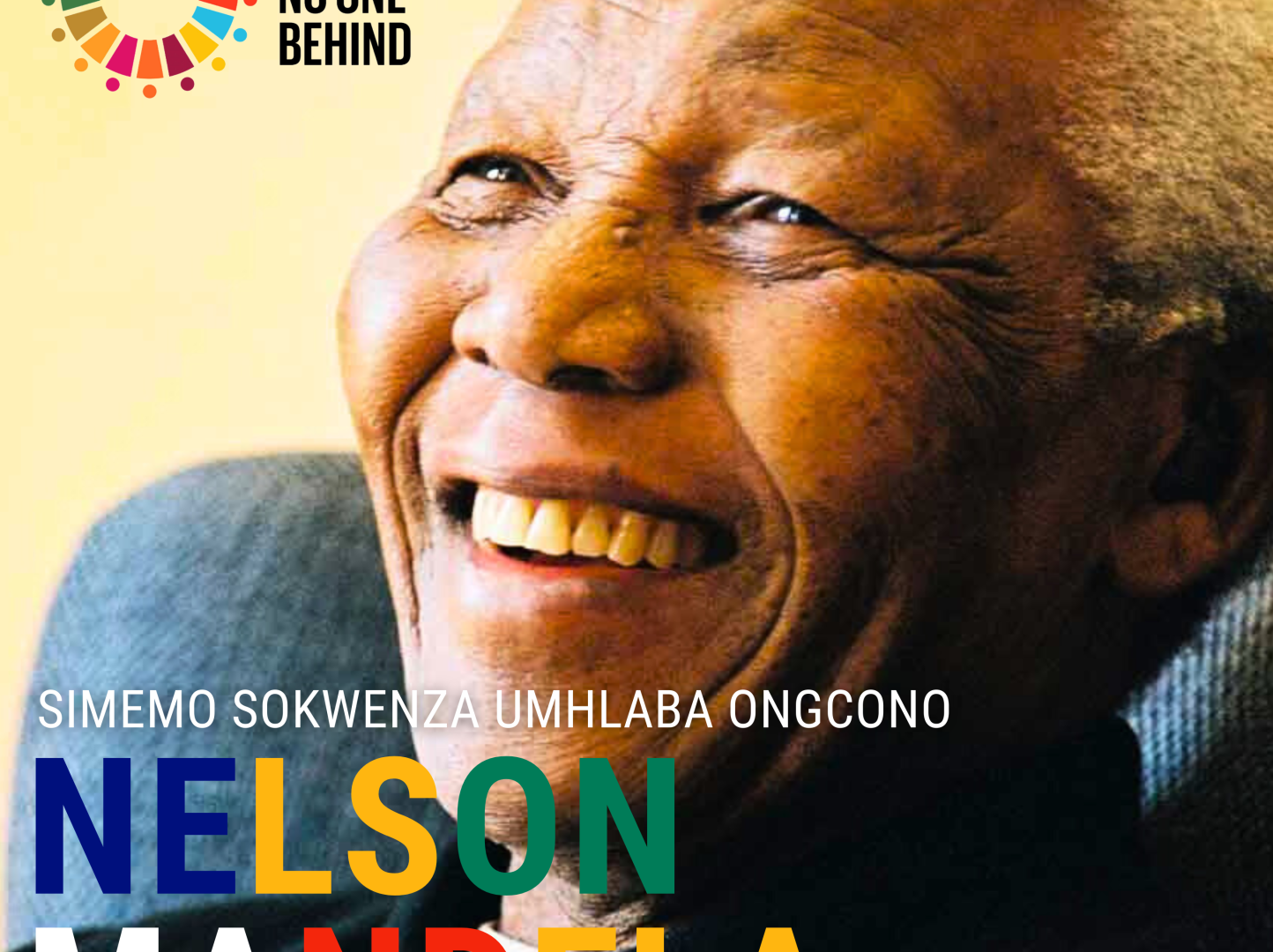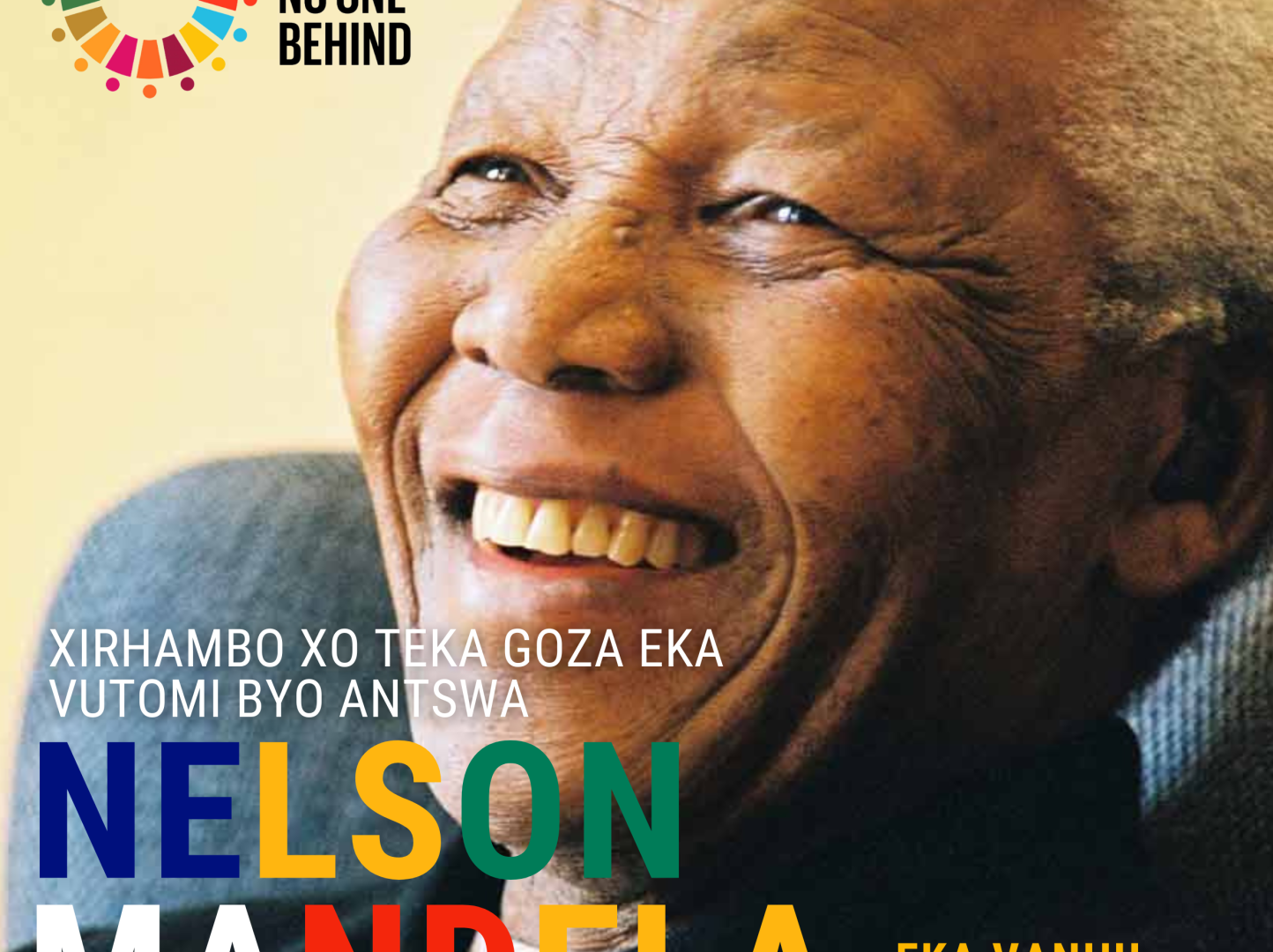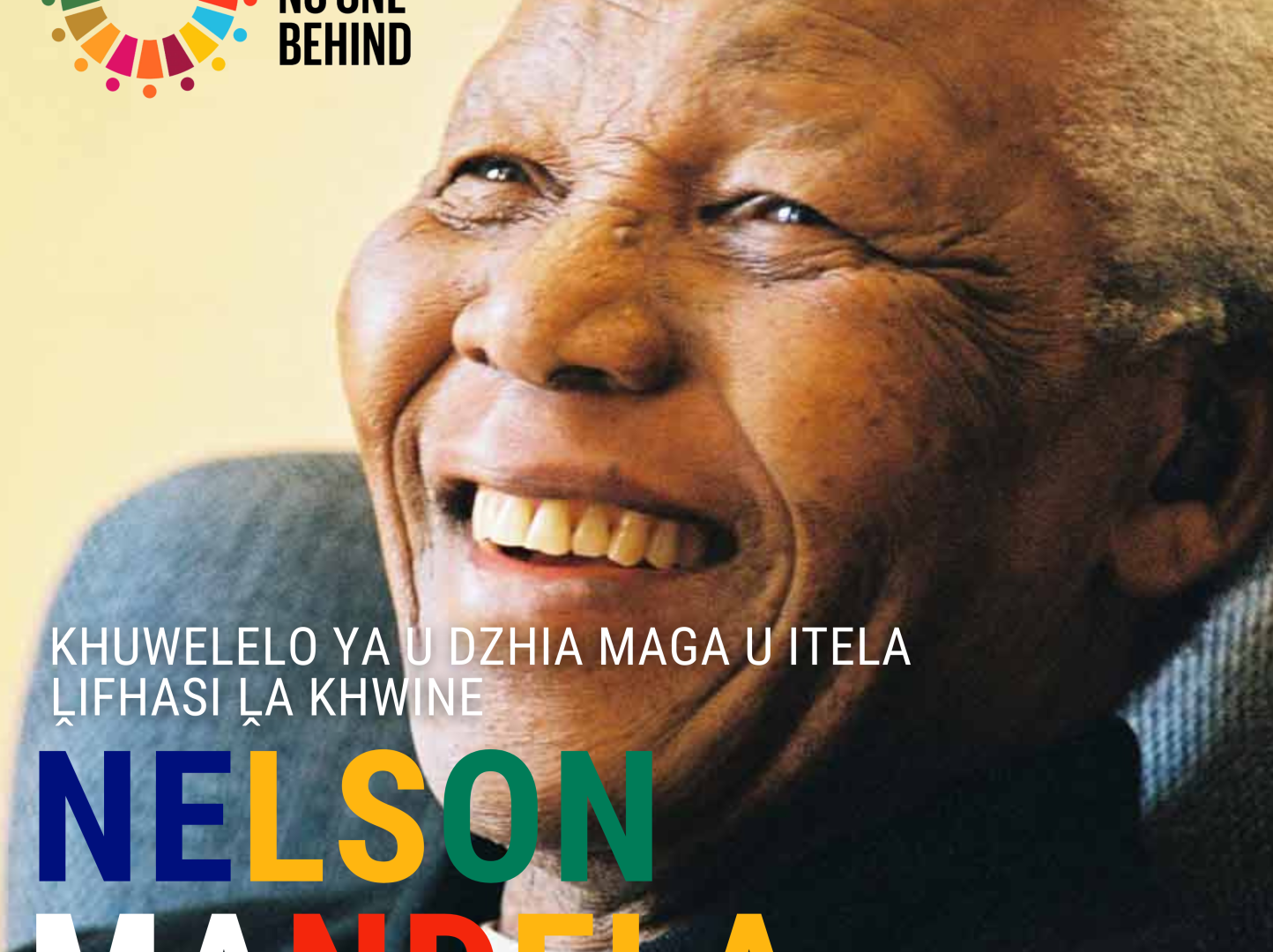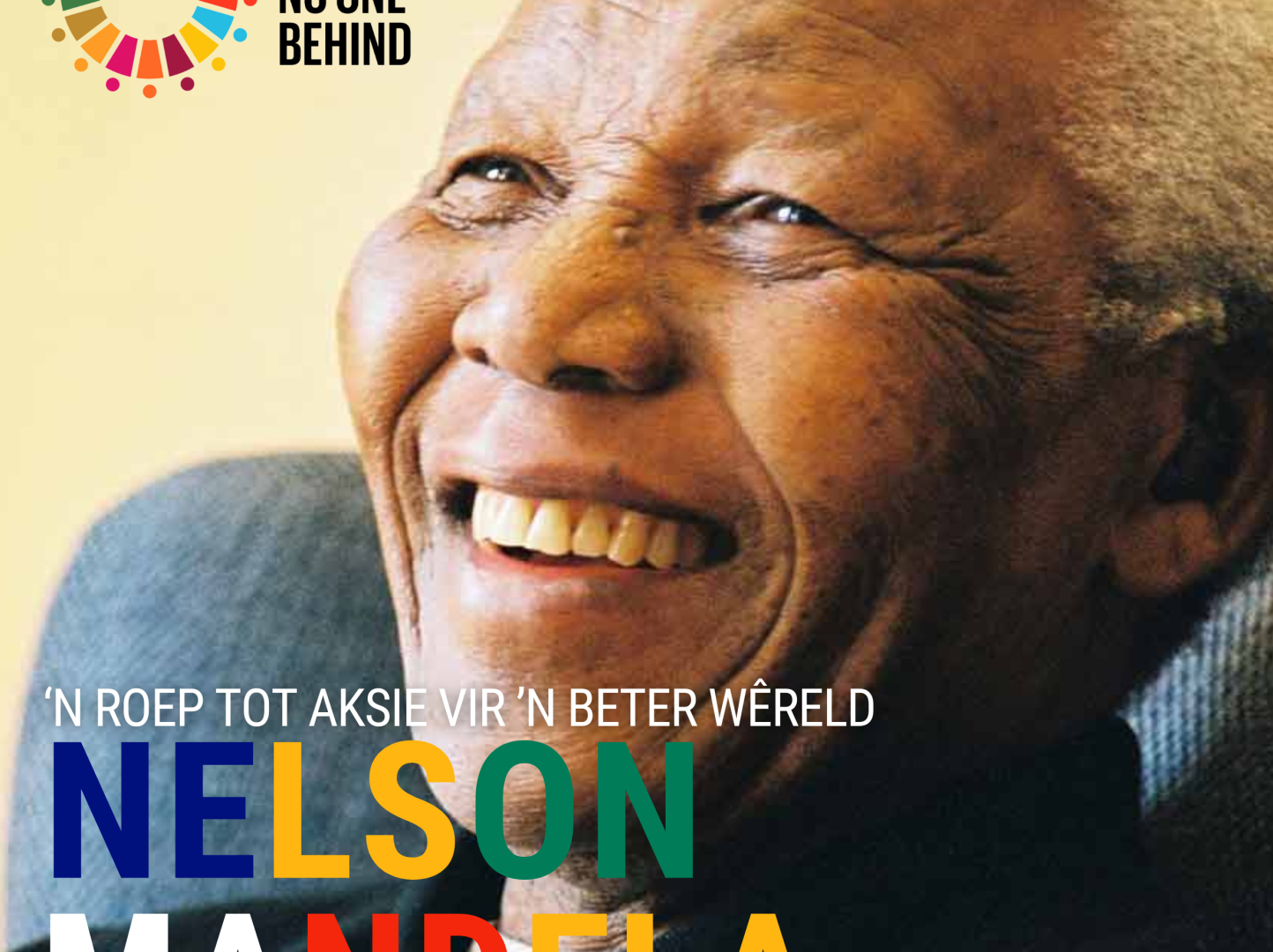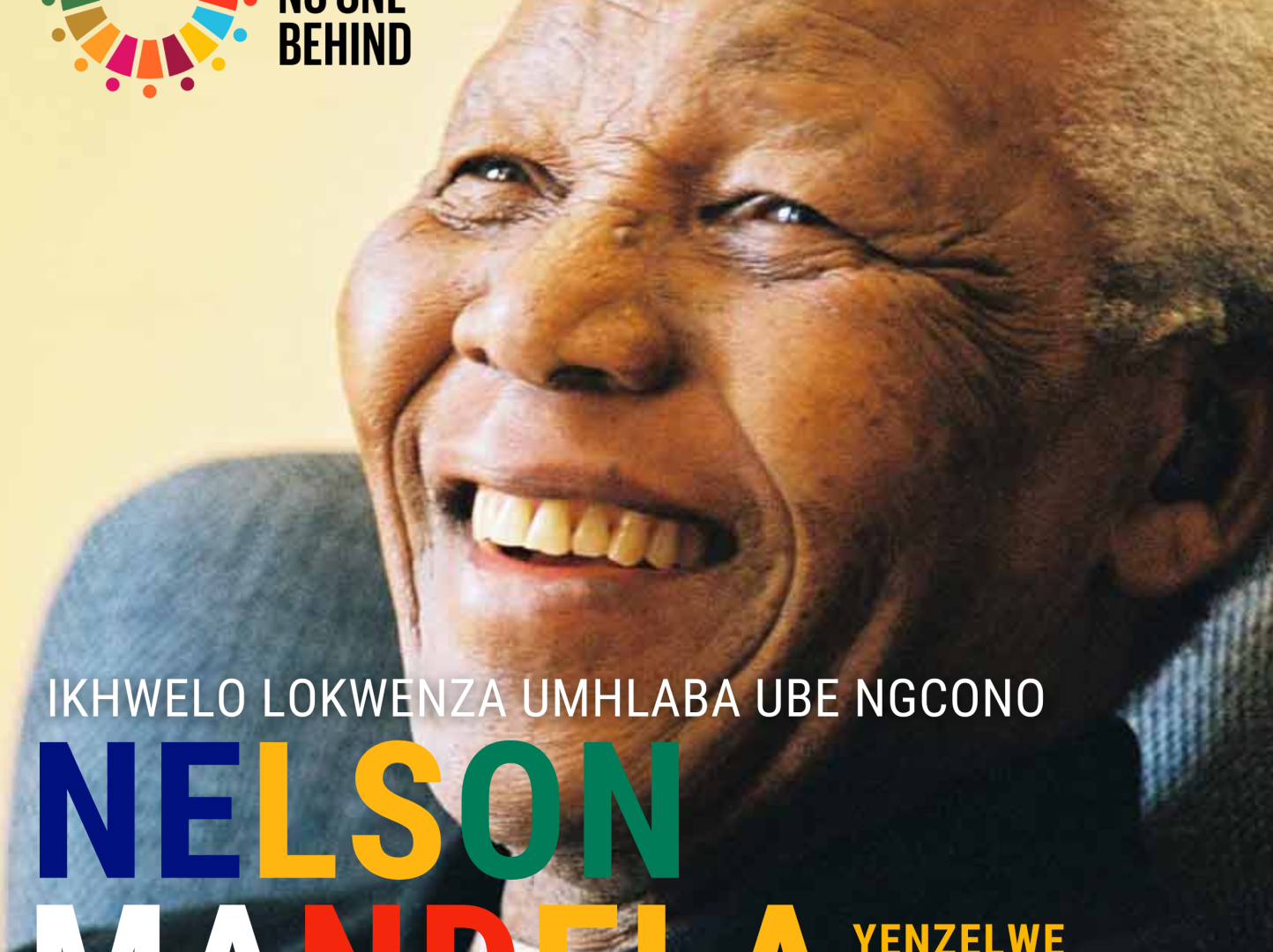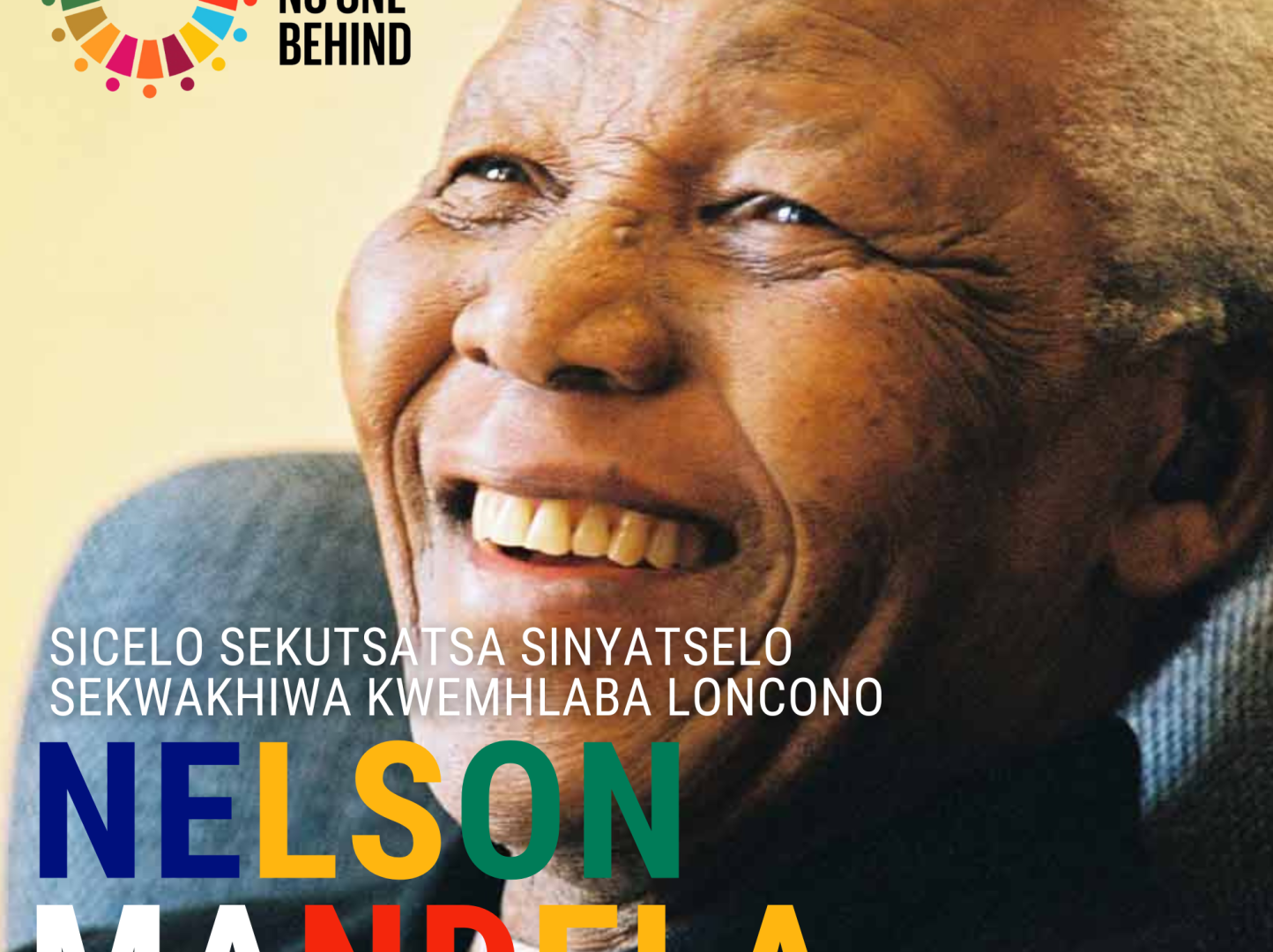Latest
Story
01 July 2025
Time for South Africa to lead: Nelson Muffuh
Learn more
Press Release
01 July 2025
African Girls Can Code Initiative empowers young women with skills for a changing world
Learn more
Story
26 June 2025
SA's G20 Presidency should focus on humanity’s most pressing challenges, says UN Resident Coordinator
Learn more
Latest
The Sustainable Development Goals in South Africa
The Sustainable Development Goals are a global call to action to end poverty, protect the earth’s environment and climate, and ensure that people everywhere can enjoy peace and prosperity. These are the goals the UN is working on in South Africa:
Story
04 October 2023
Women owning the ‘menstrual economy’: South African entrepreneur changing lives through a thriving sanitary pads manufacturing venture
Over the past few years, there have been concerted efforts to lift the veil on the taboo and stigma around menstrual hygiene. Not only have there been calls for sanitary products to be freely available but there have been conversations around who owns the means of production of these essential products.
Lindiwe Nkuna-Kgopa, 40, started thinking about putting her ring in the hat of what she calls the menstrual economy in 2015 after following these conversations and realized that in South Africa there were no women-owned, large-scale, manufacturers of sanitary products that can compete with the big suppliers. This was the start of Lindiwe Sanitary Pads which today not only sells to individual customers but supplies the South African government’s National Sanitary Dignity Programme in four provinces. In 2022 alone Lindiwe Sanitary Pads reached 10 000 girls, supplying them with a year’s supply of sanitary pads through the government’s programme, combatting period poverty. “When I started Lindiwe Sanitary Pads I felt it was unfair that women are only end-users of sanitary pads and decided we needed to be active in the menstrual economy. We need to be part of the entire value chain. Menstruation is a huge economy and it’s interesting that with all the taboos and stigma that have existed around menstruation, when it comes to the boardroom where the rands and cents are counted, suddenly men can talk about periods and get involved in the manufacturing and selling of pads,” says Nkuna-Kgopa. “Initially when I approached funders they’d turn down my applications because they said I didn’t have a manufacturing background. I had never even set foot in a factory! So they’d said ‘you don’t have the technical know-how. You are unbankable!’’ she says. An entrepreneur at heart, having previously dabbled in marketing and accounting, Nkuna-Kgopa took the rejection in her stride and decided to build the profile of a reputable sanitary pads manufacturer. When Lindiwe Sanitary pads started in 2018 the business focused on branding, packaging, and distributing sanitary pads purchased from an external manufacturer. But what the entrepreneur quickly learned is that being product-ready and having greater access to markets is costly and requires knowledge. UN Women South Africa Multi-Country Office (SAMCO), supported by NAMA Women Advancement, implemented a series of business coaching and mentoring workshops that equipped Nkuna-Kgopa and other businesswomen with the essential skills for running profitable and sustainable businesses. She is also one of the entrepreneurs on UN Women’s Buy From Women platform, which links clients who want to procure from women-owned entrepreneurs with such suppliers. “The process for getting your product ready, running it through the necessary tests, and meeting potential big clients is quite expensive. For example, traveling to meet a potential big client in Cape Town, at your own expense, is quite demanding. That’s why the programs run by UN Women for women entrepreneurs are invaluable. They trained us then put us in spaces where we can create linkages with market-potentials and eventually take advantage ,’’ says Nkuna-Kgopa. She was one of the women entrepreneurs sponsored by UN Women SAMCO through NAMA Women Advancement’s support, to attend the Africa Women in Trade Conference and Expo in Cape Town in 2022. This is where Nkuna-Kgopa met a contact who introduced her to a major client that not only bought a large supply of Lindiwe Sanitary Pads products but will also be pushing out the products into the rest of the African continent. Additionally, the contact enabled her to meet clients who took an interest in the business and provided letters of intent that have unlocked funding for Lindiwe Sanitary Pads to build a 3 500sqm factory. Additionally, her business is in the process of procuring what will be South Africa’s second-largest sanitary pads manufacturing machine which will produce 850 units per minute. Lindiwe Sanitary Pads currently employs 92 women in its peak seasons and 16 women in the quieter production periods. Nkuna-Kgopa highlights that automating the manufacturing process will not kill these jobs but grow the company’s output and revenue, allowing these women to be more securely and sustainably employed in other areas of the company. The machine is much-needed as the business expands its reach from supplying wholesalers and independent pharmacies to supplying two major retailers ’house brands. UN Women SAMCO has partnered with the South Africa Department of Women, Youth, and People with Disabilities to enhance the capacity of women-owned enterprises in the Sanitary Dignity value chain. The Sanitary Dignity Implementation Framework (SDIF) aims to ensure dignified menstruation management while promoting women’s economic empowerment.
Lindiwe Nkuna-Kgopa, 40, started thinking about putting her ring in the hat of what she calls the menstrual economy in 2015 after following these conversations and realized that in South Africa there were no women-owned, large-scale, manufacturers of sanitary products that can compete with the big suppliers. This was the start of Lindiwe Sanitary Pads which today not only sells to individual customers but supplies the South African government’s National Sanitary Dignity Programme in four provinces. In 2022 alone Lindiwe Sanitary Pads reached 10 000 girls, supplying them with a year’s supply of sanitary pads through the government’s programme, combatting period poverty. “When I started Lindiwe Sanitary Pads I felt it was unfair that women are only end-users of sanitary pads and decided we needed to be active in the menstrual economy. We need to be part of the entire value chain. Menstruation is a huge economy and it’s interesting that with all the taboos and stigma that have existed around menstruation, when it comes to the boardroom where the rands and cents are counted, suddenly men can talk about periods and get involved in the manufacturing and selling of pads,” says Nkuna-Kgopa. “Initially when I approached funders they’d turn down my applications because they said I didn’t have a manufacturing background. I had never even set foot in a factory! So they’d said ‘you don’t have the technical know-how. You are unbankable!’’ she says. An entrepreneur at heart, having previously dabbled in marketing and accounting, Nkuna-Kgopa took the rejection in her stride and decided to build the profile of a reputable sanitary pads manufacturer. When Lindiwe Sanitary pads started in 2018 the business focused on branding, packaging, and distributing sanitary pads purchased from an external manufacturer. But what the entrepreneur quickly learned is that being product-ready and having greater access to markets is costly and requires knowledge. UN Women South Africa Multi-Country Office (SAMCO), supported by NAMA Women Advancement, implemented a series of business coaching and mentoring workshops that equipped Nkuna-Kgopa and other businesswomen with the essential skills for running profitable and sustainable businesses. She is also one of the entrepreneurs on UN Women’s Buy From Women platform, which links clients who want to procure from women-owned entrepreneurs with such suppliers. “The process for getting your product ready, running it through the necessary tests, and meeting potential big clients is quite expensive. For example, traveling to meet a potential big client in Cape Town, at your own expense, is quite demanding. That’s why the programs run by UN Women for women entrepreneurs are invaluable. They trained us then put us in spaces where we can create linkages with market-potentials and eventually take advantage ,’’ says Nkuna-Kgopa. She was one of the women entrepreneurs sponsored by UN Women SAMCO through NAMA Women Advancement’s support, to attend the Africa Women in Trade Conference and Expo in Cape Town in 2022. This is where Nkuna-Kgopa met a contact who introduced her to a major client that not only bought a large supply of Lindiwe Sanitary Pads products but will also be pushing out the products into the rest of the African continent. Additionally, the contact enabled her to meet clients who took an interest in the business and provided letters of intent that have unlocked funding for Lindiwe Sanitary Pads to build a 3 500sqm factory. Additionally, her business is in the process of procuring what will be South Africa’s second-largest sanitary pads manufacturing machine which will produce 850 units per minute. Lindiwe Sanitary Pads currently employs 92 women in its peak seasons and 16 women in the quieter production periods. Nkuna-Kgopa highlights that automating the manufacturing process will not kill these jobs but grow the company’s output and revenue, allowing these women to be more securely and sustainably employed in other areas of the company. The machine is much-needed as the business expands its reach from supplying wholesalers and independent pharmacies to supplying two major retailers ’house brands. UN Women SAMCO has partnered with the South Africa Department of Women, Youth, and People with Disabilities to enhance the capacity of women-owned enterprises in the Sanitary Dignity value chain. The Sanitary Dignity Implementation Framework (SDIF) aims to ensure dignified menstruation management while promoting women’s economic empowerment.
1 of 5
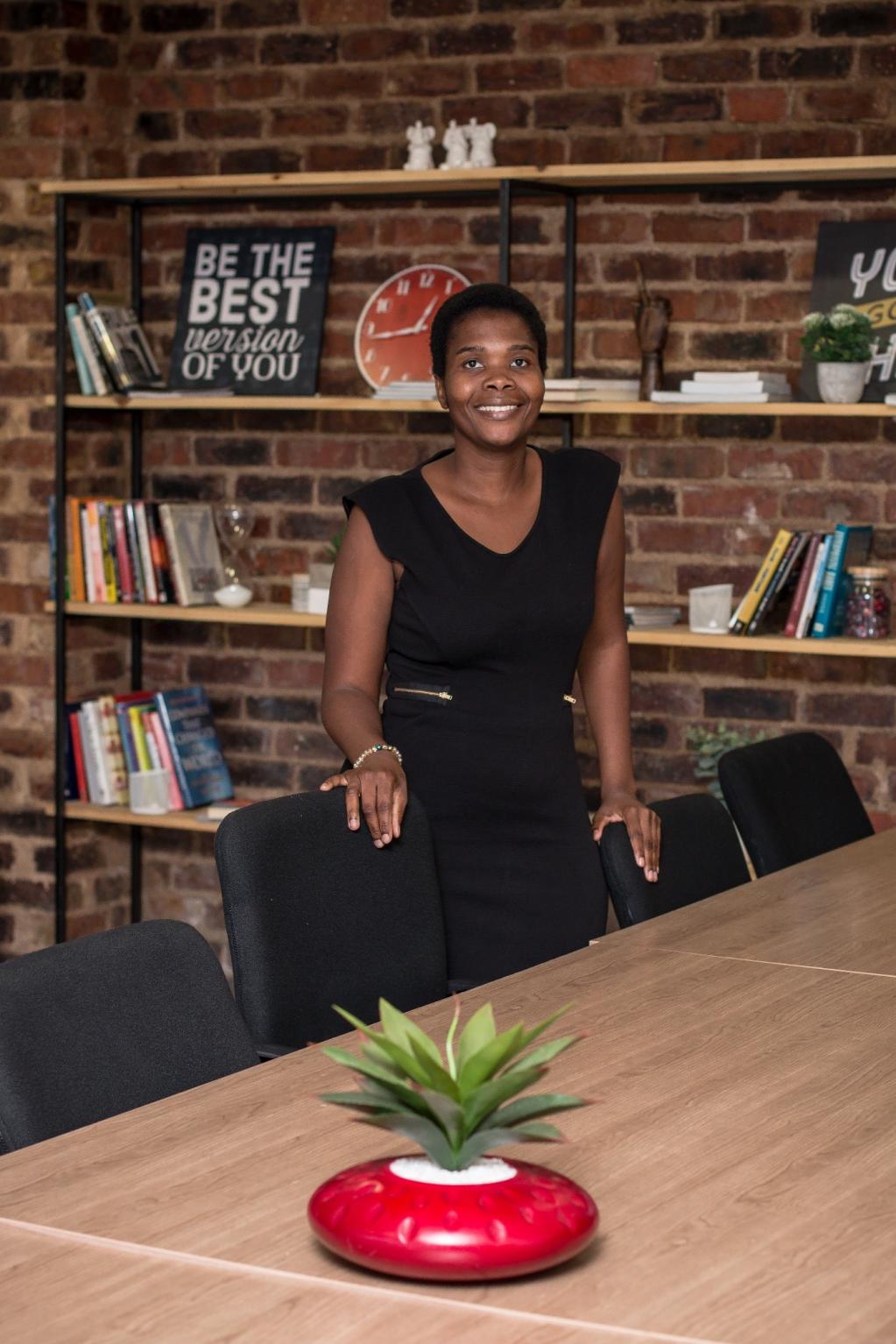
Story
04 November 2024
Agrigreat Soiltech: Youth driven initiatives for a future in sustainable agriculture, organic solitech solutions for repairing damaged soil
In order to foster community-wide innovation and sustainability, more young women should take the lead in community sustainability initiatives. Greater participation of young women in sustainability projects like Agrigreat Soiltech can improve the quality and longevity of solutions to environmental problems, while simultaneously advancing gender parity, empowering women economically, and helping communities overcome poverty. Meet 23-year-old, Buyiswa Twala, founder of Agrigreat Soiltech and Envirocare, a multiple award-winning lab that uses biowaste gathered from townships with minimal service delivery. The lab’s composts and fertilizers standout due to their organic composition and their proven ability to combat soil erosion and desertification. Ultimately, Buyiswa wants this to benefit people all throughout the globe, not only in Africa, by ensuring people have access to nutritious food. “I started out when I was 19 years old. With a few friends, we worked together to build a garden in Tembisa township, an informal settlement in Johannesburg. Although I dropped out of university owing to financial constraints, which prevented me from pursuing my scientific degree further, I overcame these obstacles by conducting my own research, developing my own formulas, and eventually running my own lab. I also had to overcome the difficulty of attracting clients and convincing them to switch from traditional, high-impact products to ones with a smaller environmental footprint. This experience taught me that the agricultural industry is woefully unprepared for the importance of sustainability, and this strengthened my resolve to do more to raise awareness about smart and sustainable agriculture," said Buyiswa.Like many others, Agrigreat Soiltech sees the increasing demand for food as a natural consequence of a growing human population. As a result, the lab needs agricultural practices that won't deplete resources and will be able to feed people in the future. The mission of Agrigreat Soiltech is to find ways to meet the demands of a growing population in a sustainable way. An essential part of industrial farming is preparing the soil. What distinguishes the lab from its competitors is its commitment to finding organic nitrogen sources for fertilizers that do not react too strongly with other natural elements. In the middle of Johannesburg's Alexandra township, Agrigreat Soiltech has established its first waste conversion station, which processes 5 tonnes of waste every month from surrounding townships. After all of South Africa's 500+ townships have their trash converted, she intends to establish a larger facility in 2025.
In addition to her work as a community organizer, Buyiswa is the brains behind the Agrigreat Stem Club in townships. The club's mission is to introduce local youth to science, technology, engineering, and mathematics (STEM) fields and the innovative technologies that are shaping them through activities like science fairs and career fairs, which she hosts in partnership with local banks, engineering firms, and other businesses. An important goal of the United Nations Framework Convention on Climate Change's Gender Action Plan is to increase the representation of women in climate-related decision-making and action by promoting their full, equitable, and meaningful involvement in these processes. More than just a question of social justice, the growing number of environmental catastrophes makes women's participation in conservation efforts a strategic need.Ms. Twala is only one of many young, forward-thinking women who can better South Africa's agriculture industry and boost economic growth.
In addition to her work as a community organizer, Buyiswa is the brains behind the Agrigreat Stem Club in townships. The club's mission is to introduce local youth to science, technology, engineering, and mathematics (STEM) fields and the innovative technologies that are shaping them through activities like science fairs and career fairs, which she hosts in partnership with local banks, engineering firms, and other businesses. An important goal of the United Nations Framework Convention on Climate Change's Gender Action Plan is to increase the representation of women in climate-related decision-making and action by promoting their full, equitable, and meaningful involvement in these processes. More than just a question of social justice, the growing number of environmental catastrophes makes women's participation in conservation efforts a strategic need.Ms. Twala is only one of many young, forward-thinking women who can better South Africa's agriculture industry and boost economic growth.
1 of 5
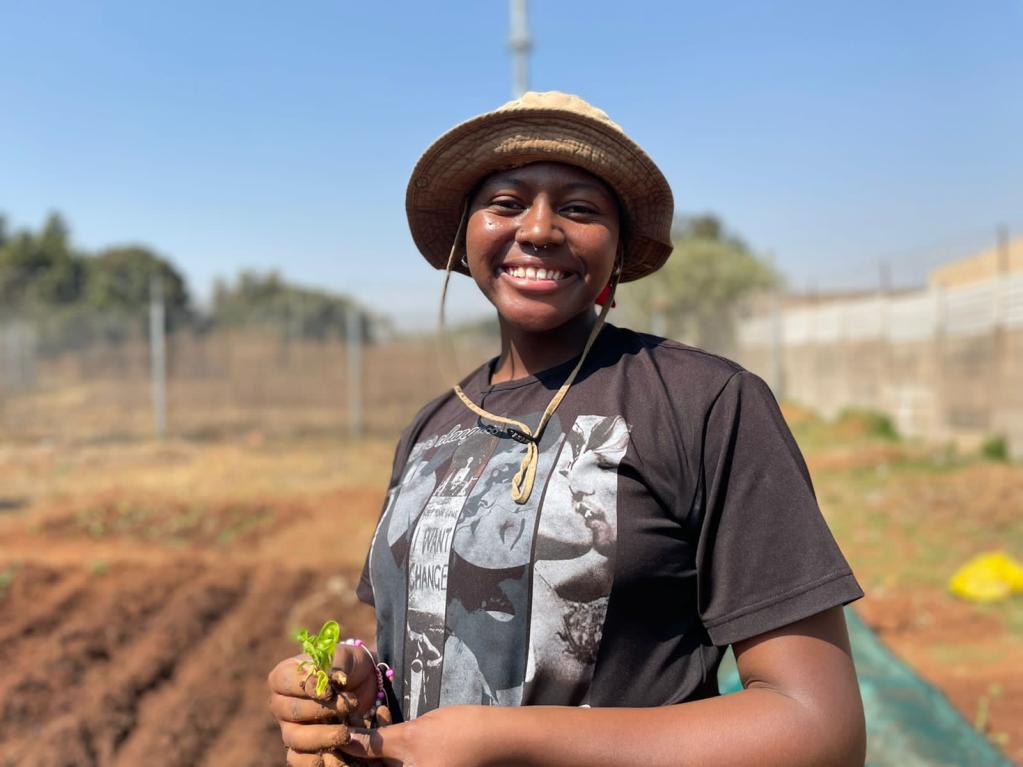
Story
04 February 2025
How mentorship shapes tomorrow’s leaders: My Journey to #AfYWL
By Lisa Rumbidzai SimangoThroughout my life, I have come to appreciate the value of building a supportive network and finding mentors committed to my personal and professional growth. My undergraduate supervisor was instrumental in this journey, connecting me with opportunities, such as the Tag a Life International (TALI) Programme in Zimbabwe. I participated in TALI while pursuing my Master of Science in International Relations, drawn to its mission of advocating for the rights of girls and young women and creating safer spaces for them—values that resonate deeply with my passions.Through the TALI programme, I was assigned a mentor whose work focused on economic justice for young women. Her passion for gender equality and socio-economic development sparked my own commitment to youth empowerment and gender justice. As I became more involved in the programs her organization was implementing, I was exposed to innovative solutions at the intersection of gender and socio-economic development. This mentorship not only deepened my understanding of the barriers women face in accessing economic opportunities, but also inspired me to explore potential solutions. These experiences strengthened my resolve to create sustainable, inclusive socio-economic solutions for Africa. In 2021, my undergraduate supervisor, once again introduced me to another programme - the African Union (AU)-United Nations Development Programme (UNDP) African Young Women Leadership Fellowship (AfYWL). Reading through the aspects of the programme and testimonies from the alumni of the programme, it felt like natural next step, perfectly aligned with my aspirations to enhance my skills in advocacy, gender justice, and project management. I submitted my application in September 2021, but despite my best efforts, at the end of the year, I received an email we all dread – we regret to inform you that…I was devastated, I questioned my abilities, my dreams and my worth, but I refused to let this setback define me. Instead, I continued engaging with civil society organizations in Zimbabwe, attending workshops on young people’s socio-economic justice and development. In August 2023, strongly encouraged by my undergraduate supervisor, I decided to reapply for the AfYWL Fellowship. This time, I approached the process with renewed confidence, a stronger support network, and a broader perspective. Drawing from my past experiences, I was determined to perform better than my first attempt and to make the most of the opportunity ahead.In November 2023, I received the exciting news that I had advanced to the final interview stage of the AfYWL Fellowship Programme. Though nervous, I found strength in the unwavering support of my family. The anticipation was overwhelming, but in mid-December, I received the best Christmas gift of all: I had been selected for the third cohort of the Fellowship! Early in 2024, I confirmed my participation and eagerly awaited deployment. On March 11, 2024, I was informed that I would be deployed to South Africa. A swirl of emotions—excitement and apprehension—filled me, but I embraced this new chapter with purpose and determination.Reflecting on my journey, I recognize how setbacks, such as my initial rejection, became valuable steppingstones to personal growth. After that first disappointment, I invested time in self-development, seeking guidance and mentorship to help shape my career path.The mentors I’ve had the privilege to learn from have been instrumental in shaping my journey. Their wisdom, encouragement, and willingness to invest time in my development have not only influenced my professional trajectory, but also strengthened my confidence and sense of direction. This journey has also taught me the art of identifying mentors. It begins with understanding your aspirations and seeking out individuals whose experiences and values align with your goals. Mentors can take many forms—leaders, peers, or even those with fresh perspectives. The key lies in approaching these relationships with openness, respect, and a genuine desire to grow.Equally important is how you use their guidance. Asking thoughtful questions, tailoring their advice to your unique circumstances, and holding yourself accountable to the progress you make are critical steps. Mentorship is not about mimicry; it’s about becoming the best version of yourself by leveraging the wisdom they share.Now, as I continue this next chapter as a fellow attached to the UNDP South Africa country office, as the youth empowerment coordinator, I am excited to continue growing as a young African woman leader, championing gender equality, socio-economic development, and the empowerment of future generations.Having benefited immensely from mentorship, I am committed to giving back. I am eager to empower others, sharing the lessons I’ve learned and helping them navigate their own paths. Mentorship is a powerful cycle of growth and generosity, and I am proud to contribute to its continuity.First published by UNDP South Africa: How mentorship shapes tomorrow’s leaders: My Journey to #AfYWL | United Nations Development Programme
1 of 5
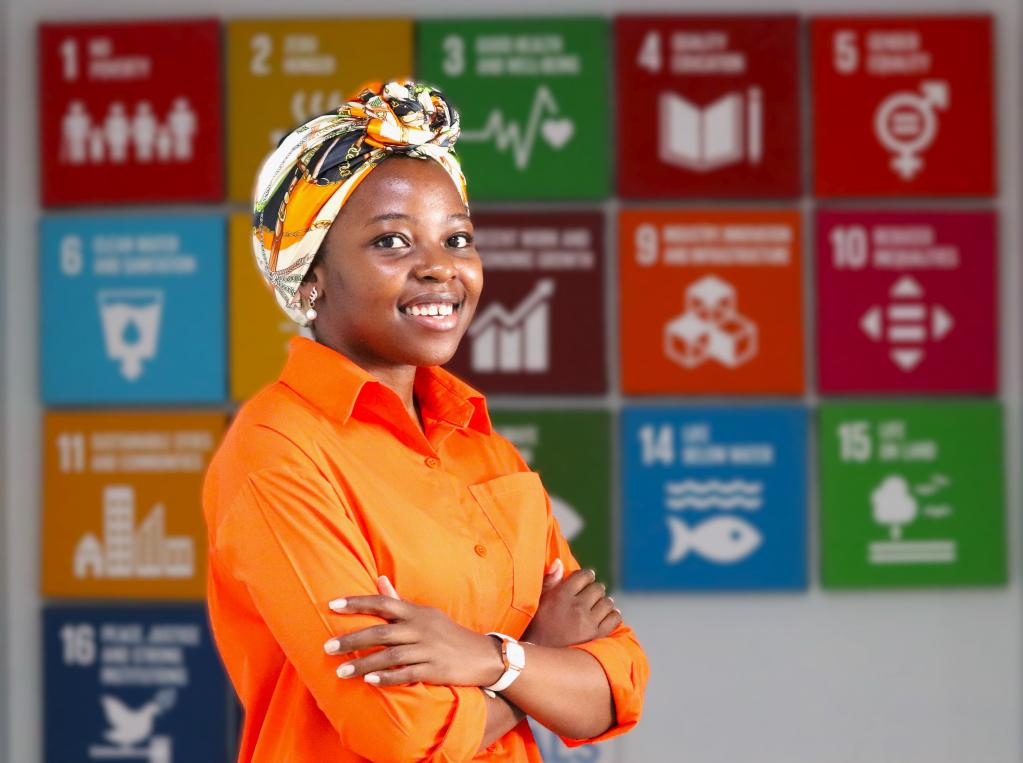
Press Release
22 June 2023
Uniting Against Hate: UN South Africa and partners join forces to combat Hate Speech
JOHANNESBURG, 22 June, 2023 – The United Nations in South Africa in partnership with the Apartheid Museum, the Desmond Tutu Foundation and the Johannesburg Holocaust and Genocide Centre, Media Monitoring Africa (MMA) hosted a panel discussion and a training workshop on hate speech and mis/disinformation to commemorate the International Day for Countering Hate Speech. The overall goal of the event was to bring awareness to and discuss hate speech and mis/disinformation as well as to equip participants with knowledge and practical skills on how to address these ills online.
In his speech, Mr. Nelson Muffuh, the United Nations Resident Coordinator in South Africa, emphasized the UN's commitment to “upholding the principles of human rights, non-discrimination and the right of every individual to be treated with respect and dignity regardless of their nationality, race, religion, gender, ethnicity or sexual orientation. These are precisely the principles and rights that hate speech seeks to suppress.”
Mr. Muffuh also stressed that countering hate speech is a moral obligation that falls on all of us, whether we are government authorities, civil society organizations, the private sector, the media, youth, traditional and customary leaders, or simply individuals. He added that hate speech has a devastating impact on social cohesion, human relations, and safety, and that we must do everything in our power to combat it.
Speaking on a panel, Abigail Noko, Regional Representative for Southern Africa, Office of the United Nations High Commissioner for Human Rights (OHCHR) called for collective efforts towards building positive jurisprudence, saying that states have a mandate to safeguard human rights and must be liable to address incitement of racial discrimination and tackle hate speech.
Janet Jobson, Chief Executive Officer, Desmond and Leah Tutu Foundation, in her message of support called for vigilance around misinformation and disinformation, as hate speech is becoming more prevalent in our society. “We must ensure that we do not fall into the logic of hatred and must not let hatred stand unchallenged. Our humanity is fundamentally bound up with each other and, we must counter hate speech whenever and wherever we encounter it,” said Ms. Jobson.
William Bird, Director of Media Monitoring Africa, also weighed in on the subject and the event saying, “Hate speech doesn’t just cause harm, it incites violence and undermines democracy. We commemorate the International Day for Countering Hate Speech recognizing our recent past, aware that some still seek to use hate speech to silence, bully, denigrate and rob people of their dignity. We all have a responsibility to combat and call out hate speech, but just what is it and how can we do so? Join us as we hear from experts and launch our course to empower the public to act against hate speech online.”
The panellist included Tali Nates, Director, Johannesburg Holocaust and Genocide Centre, Ben Winks, Independent Advocate and Thandi Smith, Head of Programmes, Media Monitoring Africa and focused on “Understanding hate speech from a legal standpoint, its impact on victims and their human rights and, strategies being employed to combat the scourge.”
The participants also had a chance for some insight and messages from Alice Nderitu, UN Special Adviser on the Prevention of Genocide, Janet Jobson, CEO of the Desmond and Leah Tutu Foundation and Honourable Ourveena Geereesha Topsy-Soono, African Commission on Human and People’s Rights Special Rapporteur on Freedom of Expression and Access to Information in Africa.
MMA also launched a programme on hate speech training. Dubbed Hate Speech Spotters Programme (HSSP). The goal is to bring awareness to hate speech, its impact on victims/target groups online, as well as how and why spreading such content is harmful and hurtful. The HSSP is designed for both those who have disseminated or are purveyors of online harms.
For media enquiries please contact: Eunice Namugwe, UN Information Centre – Pretoria, Email: namugwe@un.org, Tel : +27 71 6828310
PHOTOS of event here: https://www.flickr.com/photos/uninsouthafrica/albums/72177720309219465
1 of 5
Story
18 September 2023
The vital role of Indigenous Languages in shaping informed and engaged communities through the Media
The United Nations in South Africa South, in collaboration with the South African National Editors’ Forum (SANEF) and the Pan South African Language Board (PanSALB), recently hosted the inaugural Indigenous Languages and the Media seminar in Johannesburg, South Africa.
The diversity of languages spoken in South Africa is greatly influenced by indigenous languages. It is crucial for their preservation that the media use and promote them. Sadly, there has been a loss in the understanding and usage of indigenous languages, particularly among young people, and less usage of indigenous languages by the media. The seminar sought to discuss and resolve these problems by bringing together key players, such as PanSALB and well-known indigenous language practitioners and media personalities, in order to have open discussions and to start dialogues that could result in practical solutions after the seminar.
In his remarks, Mr. Tafirenyika highlighted the UN’s role and efforts through the UN Educational, Scientific and Cultural Organization (UNESCO) in saving indigenous languages around the world as well as the lessons learned thus far.
“The UN is therefore appealing to all South Africans, including the government, the business sector, the civil society and individuals to do everything in their power to protect and promote linguistic diversity. Such an approach will strengthen, not weaken, our collective cultural heritage. And I can’t but fail to notice that this conference is taking place in September, which is South Africa’s heritage month,” he said.
He told participants that one of the most effective ways to preserve indigenous languages was to develop effective mechanisms for advocacy and awareness campaigns. “This is where the role of our partners in the media becomes crucial. Let me take this opportunity to commend the SABC, the national public broadcaster, for running radio stations with programmes that are broadcast in all the 11 official languages of South Africa.”
The UNIC director urged the media to promote and protect linguistic diversity and form partnerships to preserve cultural diversity and respect traditional ways of life. Governments should enact laws to conserve indigenous languages, such as mobilizing funding, defending linguistic rights, and incorporating these languages into educational systems. He further emphasized that “education is the main instrument in our toolbox of language preservation”.
The necessity of information, which is key to participation in a democracy was highlighted by Professor Abiodun Salawu, a professor of Journalism, Communication, and Media Studies at the North West University, and Director of the research entity, Indigenous Language Media in Africa (ILMA). The media has a role to inform the masses in a language they will understand, he said.
Prof. Salawu told his audience that the development of alternative media and the use of regional languages and creoles have been key factors in the evolution of participation issues, which are essential to democracy. He urged the media to take all the indigenous languages to platforms that the youth can relate with such as social media and reminded attendees that “indigenous language media still remain a potent vehicle for mobilizing people for positive (developmental) goals which include democracy.”
In his address, Lance Schultz, the PanSALB Chief Executive Officer called for the end to “social linguistic tribalism which is essentially a lack of respect for our indigenous languages. We must be intentional with how we communicate for an informed and engaged citizenry,” he added.
“The global decline of print media has negatively affected the development of indigenous languages. Therefore, the need to forge collaborative efforts between the media, parents, teachers and various other stakeholders to promote indigenous languages is now more pertinent than ever.”
The Treasurer-General of SANEF, Tshamano Makhadi, reaffirmed his organization’s commitment to serve the needs of community media and open opportunities for the development of indigenous languages in this sector and beyond. “This proactive stance not only strengthens the vital role of community media but also fosters inclusivity and cultural diversity, creating a richer tapestry of voices in our ever-evolving media landscape, he said, adding: “Through its steadfast efforts, SANEF paves the way for a more inclusive and vibrant media ecosystem, where indigenous languages can flourish, and communities can thrive.”
The recognition of the media's pivotal role in reaching diverse audiences underscores the importance of broadcasting in indigenous languages. As the current media landscape predominantly operates in English, there is an urgent imperative to document, educate, and fortify the usage of indigenous languages.
Embracing technology and fostering innovation becomes paramount in this endeavor, encompassing initiatives like translating books and dictionaries into indigenous languages and developing accessible mobile apps and online platforms. Moreover, the formulation of laws and policies, aligned with UN frameworks such as the UN Declaration on the Rights of Indigenous Peoples, becomes imperative to ensure the preservation and prosperity of indigenous languages for the betterment of all humanity. This multifaceted approach not only enriches people’s cultural fabric but also champions inclusivity and linguistic diversity in the global media landscape.
1 of 5
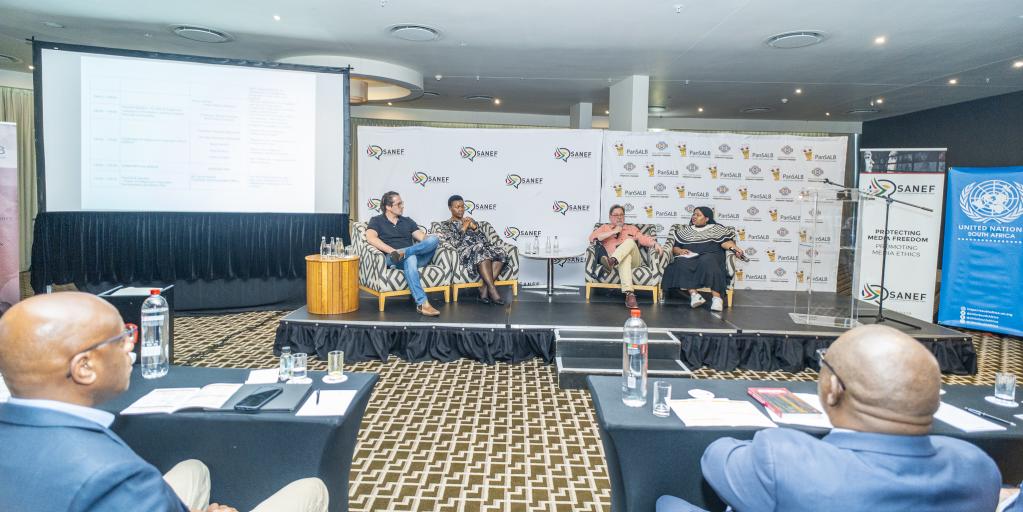
Story
01 July 2025
Time for South Africa to lead: Nelson Muffuh
As the world prepares for the Fourth International Conference on Financing for Development (FFD4), the imminent Compromiso de Sevilla marks a critical inflection point in our collective journey toward the 2030 Agenda.For South Africa, this moment is not only timely —it is transformative.South Africa’s G20 Presidency, the first on the African continent, coincides with a period of profound transition.The country is navigating the early stages of a Government of National Unity, implementing the Medium-Term Development Plan (MTDP 2024 —2029), and finalising a new UN Sustainable Development Cooperation Framework (Cooperation Framework).These converging milestones offer a unique opportunity to reimagine development finance in ways that are inclusive, catalytic, and future fit.As South Africa leads a delegation to Seville this week to join the UN Secretary-General, and other world leaders including the host Prime Minister Sanchez, it is encouraging to note the call in the Compromiso de Sevilla for capitalization of the multilateral development banks, increased voice and representation for developing countries in global economic decision-making, and enhanced trade and financial integrity, including the creation of forums to address illicit financial flows and the role of credit rating agencies.These are essential to restoring trust and fairness in the global economy.South Africa’s leadership in these areas can set a precedent for others to follow.The Compromiso de Sevilla also provides a blueprint that resonates with South Africa’s development trajectory.It reinforces the centrality of social protection, climate finance, taxation, private financing, tax cooperation, and debt reform —areas where South Africa has both urgent needs and bold ambitions.The MTDP, endorsed by Cabinet, positions inclusive growth, job creation, poverty eradication, accountable institutions, just energy transition and climate resilience as national imperatives.These priorities are echoed in the current UN Sustainable Development Cooperation Framework’s four strategic pillars and the six SDG transitions—food systems, energy, digital connectivity, education, jobs and social protection, and climate action.South Africa’s leadership in the G20 and other multilateral spaces offers is an opportunity to champion reforms that matter deeply to the Global South.The call to establish a sovereign debt facility and a new intergovernmental tax body aligns with South Africa’s advocacy for a fairer global financial architecture.South Africa can lead the charge in ensuring these mechanisms are not only adopted but implemented with urgency and equity.These reforms are not abstract, they are essential to unlocking fiscal space for people- centered and planet-sensitive investments in health, education, energy, and Infrastructure.At home, the development of an Integrated National Financing Framework (INFF) can help align all sources of finance —public and private, domestic and international —with the SDGs.The UN system stands ready to support this effort, building on our joint work to localise the SDGs through the District Development Model and to accelerate progress through the six transitions and their associated “engine room” actions.These transitions are not theoretical.They are grounded in South Africa’s lived realities—from energy poverty in informal settlements to digital exclusion in rural areas, from youth unemployment to climate vulnerability.The Just Energy Transition Investment Plan (JET IP), Operation Vulindlela on structural reforms, the Climate Change Act and the associated Nationally Determined Contribution, and the push for expanded social protection, better education outcomes, transformed food systems, universal broadband are all examples of how South Africa is turning ambition into action.But ambition alone is not enough. We must finance it.As United Nations Secretary-General António Guterres recently reminded us:“We cannot let our financing for development ambitions get swept away.We have just five years to reach the Sustainable Development Goals. We need to shift into overdrive, and that includes making good on the commitments countries made in the Pact for the Future… from a necessary stimulus to help countries invest in their people, to vital and long-awaited reforms to the global financial architecture”.The FFD4 conference is a chance to move from rhetoric to results. South Africa can lead by example—by championing rights-based reforms globally and implementing them locally.By aligning its G20 agenda with the SDG transitions. By ensuring that every rand spent is an investment in a more just, resilient, and sustainable future.Its citizens, the continent and the rest of the world are watching. And South Africa is ready to lead. – By Nelson Muffuh, UN Resident Coordinator in South Africa 30 June 2025.Published by SABC News: https://www.sabcnews.com/sabcnews/south-africas-moment-to-lead/
1 of 5
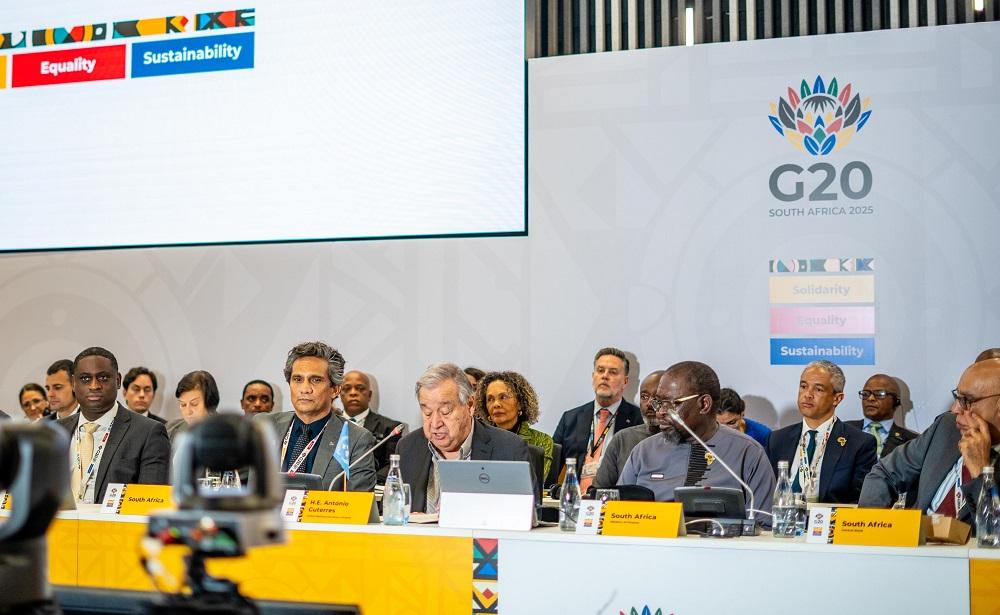
Story
26 June 2025
SA's G20 Presidency should focus on humanity’s most pressing challenges, says UN Resident Coordinator
As South Africa’s Group of 20 (G20) Presidency approaches its final six months, the focus should be on fostering multilateral cooperation and finding collective solutions to humanity’s most pressing challenges. According to the United Nations (UN) Resident Coordinator in South Africa, Nelson Muffuh, the world’s major economies should aim to develop innovative approaches to complex global issues related to poverty, unemployment, and sustainable development.“The countries that carry the economy of the world must come together and find each other and resolve some of the challenges. “They need to agree on some of the common solutions they can advance to resolve issues of inequalities, poverty, unemployment, governance, and trade. So, I think group, which is often referred to as a ‘ginger group’, is really an important platform as part of the wider multilateral system which the UN embodies.” Muffuh was speaking to SAnews during the third Sherpa meeting of the G20, which began on Wednesday.The Sun City Convention Centre in the North West was filled with representatives from the world’s largest economies and organisations as Zane Dangor, the Director-General of the Department of International Relations and Cooperation and South Africa’s G20 Sherpa, delivered his opening remarks.Muffuh believes that South Africa’s G20 Presidency is making significant progress in addressing global challenges, with an emphasis on promoting solidarity, equality, and sustainability. Halfway through its Presidency, the country has already held 70 out of a planned 132 meetings across various working groups, focusing on critical issues affecting the international community.“So, we need to look at where we are with regards to the momentum towards achieving some of the envisaged outcomes around reform of the international financial architecture, capitalisation of the multilateral development banks, financing for the SDGs [Sustainable Developmental Goals] and financing for climate action, Just Energy Transition, the tackling of inequalities. A lot of these issues have been discussed extensively,” he told SAnews. According to the UN official, the Presidency should strengthen multilateral cooperation as global tensions hinder collective progress.“We’re not on track to achieve the outcomes of the Sustainable Development Goals, for example. So, I think the focus really should be on ensuring we do not lose track, despite the concerns, despite the intentions to still find ways of coming together, find each other, and common ground to make progress.”A central theme emerging from meetings is the urgent need to overcome geopolitical divisions and work collaboratively on pressing global challenges. Despite ongoing tensions, including notable absences like the United States, Muffuh said the G20 remains committed to creating a platform for constructive dialogue and finding common solutions.He believes that the upcoming international gatherings, such as the Financing for Development Conference, the 30th Conference of the Parties to the United Nations Framework Convention on Climate Change (COP30 Summit), and the UN General Assembly, will create additional opportunities to enhance the G20’s collaborative efforts and advocate for meaningful global progress. First published by – SAnews.gov.za
1 of 5
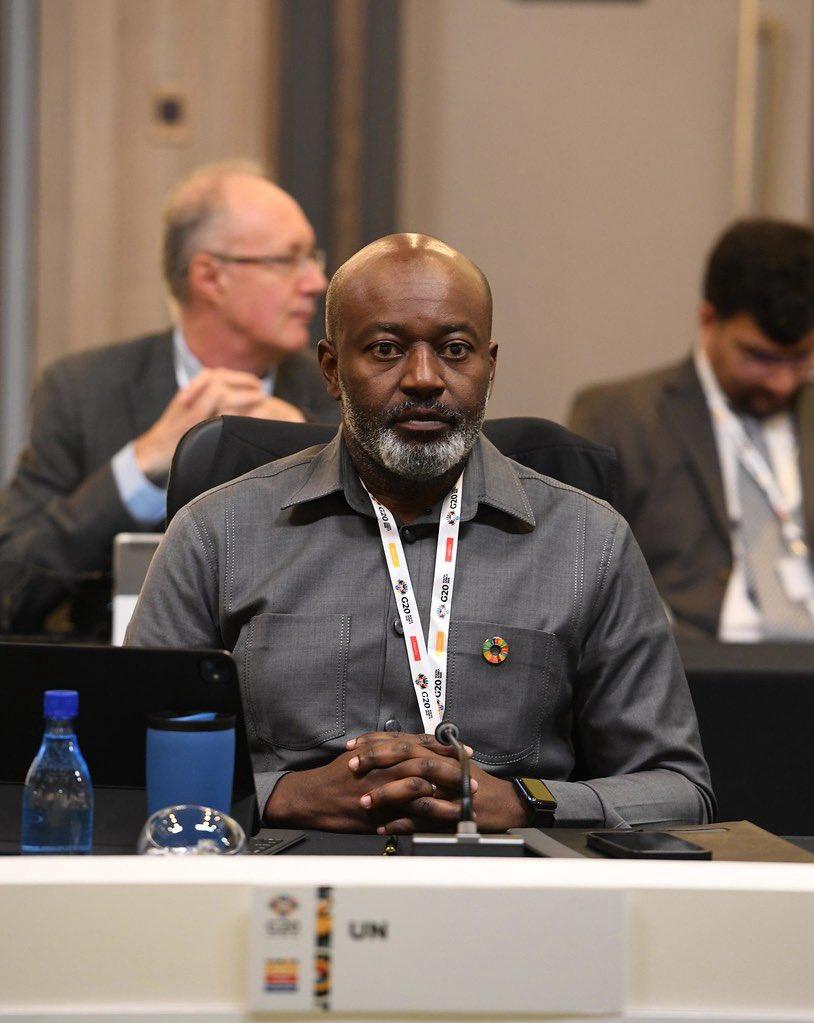
Story
20 June 2025
Advancing solidarity for refugees through action
World Refugee Day 2025 was marked by a powerful call for solidarity and inclusion, as the United Nations High Commissioner for Refugees joined hands with the South African Government and key stakeholders to honour refugees and the communities that host them. Held on 20 June 2025, at the Heartfelt Arena in Thaba-Tshwane, Pretoria, the commemoration carried the global theme “Solidarity with Refugees.” It came at a critical time, with forced displacement reaching record levels of over 122 million people globally, according to UNHCR’s latest Global Trends Report.This year’s commemoration served as a platform to recognize the courage of those forced to flee conflict and persecution, while also celebrating the compassion extended by the communities that welcome them. The programme brought together high-level government officials, members of the diplomatic corps, civil society representatives, refugee-led organisations, and private sector leaders reflecting a shared commitment to protecting the rights and dignity of displaced people.Mr. Igor Ciobanu, UNHCR Representative a.i, formally welcomed guests, setting the tone for a day rooted in solidarity and shared commitment. Delivering remarks on behalf of the United Nations, Mr Nelson Muffuh, UN Resident Coordinator, drew attention to the growing disconnect between rising refugee needs and diminishing global support.“Becoming a refugee is never a choice—but how we respond is,” he said, quoting the UN Secretary-General. “Let us choose solidarity. Let us choose courage. Let us choose humanity.” Muffuh also emphasized South Africa’s longstanding role as a regional haven for the displaced.” As part of the day’s commitments, Mukuru, represented by Pearl Mphuthi, Head of Corporate Social Investment (CSI), generously donated R20,000 to UNHCR in support of its refugee programmes. In her remarks, Mphuthi underscored the importance of empathy, inclusion, and the shared human experience, highlighting that true solidarity begins with recognizing that belonging is a right, not a privilege. “Celebrating humanity means standing with those who’ve lost everything. Belonging is a right—not a privilege.” In a further show of solidarity, Zhauns Marketing Executive, Mr. Riad Ahmed, donated baking machinery to support refugee entrepreneurs in building sustainable livelihoods. Similarly, Ashraful Aid’s CEO pledged USD 10,000 towards UNHCR’s efforts in South Africa, reinforcing the importance of collaborative support from across sectors.The day also emphasised the legal and policy frameworks essential for refugee protection. Adv. Aubrey Sedupane, representing the Department of Justice and Constitutional Development, referenced the Prevention and Combating of Hate Crimes and Hate Speech Bill, urging that solidarity must be matched with action:“Let us go beyond words—toward legislative reform, safe spaces, and the upholding of dignity, equality, and the principle of Ubuntu.”Echoing these sentiments, Mr. Mandla Madumisa, Chief Director of Asylum Seeker Management at the Department of Home Affairs, reflected on the 30th anniversary of South Africa’s Constitutional Court, calling for continued constitutional protection of refugees:“Standing with refugees is standing with the Constitution.”Refugee-led networks took to the stage to shed light on the daily realities and systemic challenges faced by displaced communities in South Africa. Through powerful and emotional testimony, representatives called for urgent policy responses, including a one-time amnesty for individuals who lost legal documentation during the COVID-19 pandemic, decisive action to end corruption, and a renewed sense of empathy and compassion from host communities.“Where must we go?” asked one representative. “Africa did not shut its doors during apartheid. We ask you not to slam them on us now.” Their voices served as a reminder that beyond policy and programming, the lived experiences of refugees must be heard, respected, and placed at the centre of all protection efforts.A standout feature of the day was a high-level panel discussion on “Sport for Social Cohesion”, moderated by renowned broadcaster and UNHCR Goodwill Ambassador Leanne Manas. The panel brought together a distinguished lineup of speakers, including acclaimed pulmonologist and former refugee Dr Emmanuel Taban, alongside respected academics, policymakers, and sports leaders.The discussion explored how sport can act as a unifying force between refugee and host communities, while promoting inclusion, healing, and mutual understanding. Panellists emphasised the importance of elevating refugee voices—particularly those of women, youth, and children—in sport-related initiatives. The session also facilitated dialogue among researchers, practitioners, and decision-makers, sharing best practices and calling for sustained support to strengthen sport as a tool for social cohesion.The day concluded with a vibrant celebration of culture, resilience, and community. Guests were treated to captivating performances by dancers from the South African Dance Academy and a lively Congolese cultural group, whose traditional and contemporary routines embodied the spirit of unity and belonging. These artistic expressions complemented the broader programme of activities, which included a basketball tournament organised in collaboration with Sunnyside Basketball Club and Judo for Peace promoting health, teamwork, and social cohesion.World Refugee Day 2025 served as a powerful reminder that when we act together with empathy, respect, and purpose we can build societies rooted in hope, dignity, and shared humanity. Now more than ever, we are called to stand with refugees not only in words, but in action.
1 of 5
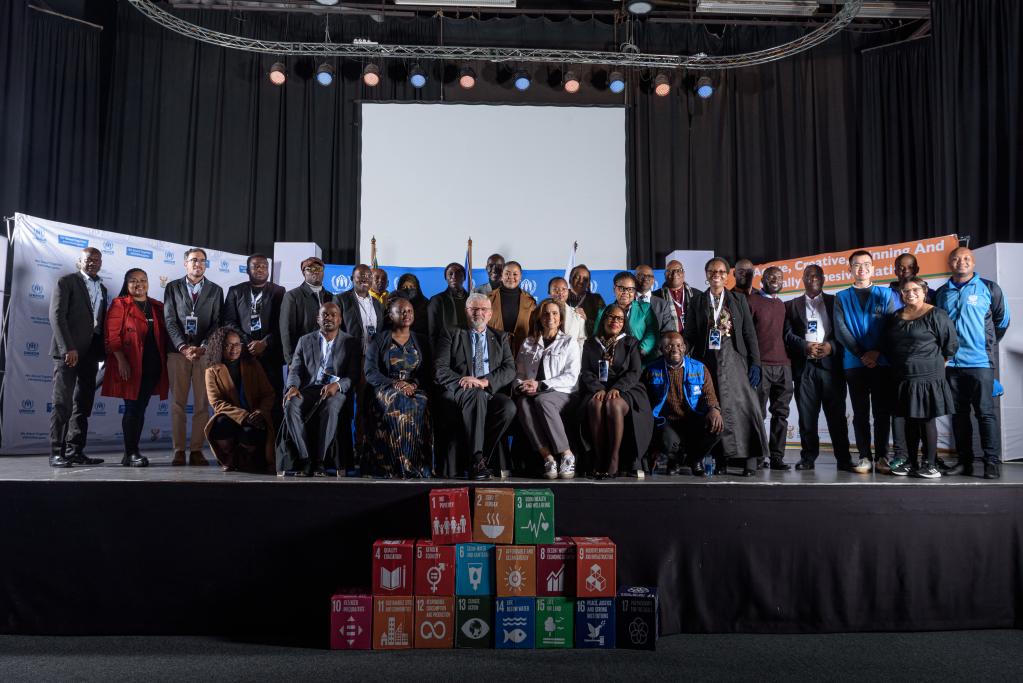
Story
16 June 2025
Youth Day 2025: Empowering young people for meaningful economic participation
June is Youth Month in South Africa to recognise the important role that young people played in the battle against apartheid, especially during the Soweto Uprising of 1976. The uprising, organised by brave students who were protesting against unfairness in the education system, was a turning point in the country's fight for freedom. June 16 was named National Youth Day in honour of their sacrifice when democracy began in 1994. It is a day of memory, but also a day of regeneration and a promise to give today's youth more influence.The United Nations in South Africa was delighted to be a part of the national celebrations at the NWU Rec Farm Stadium in Potchefstroom, JB Marks Local Municipality, North West Province, for this year's Youth Day. The 2025 theme, "Skills for the Changing World—Empowering the Youth for Meaningful Economic Participation," was all about giving young people the tools they need to succeed in a global market that is changing quickly.“On Youth Day 2025, we pay tribute to the courage of past generations and celebrate the creativity, resilience, and agency of today’s young people. As a generation with unlimited potential, youth are not merely participants in our collective progress — they are co-creators of a more inclusive, sustainable, and just future. It is our shared responsibility to build a world that reflects and honours their vision.” — Nelson Muffuh, United Nations Resident Coordinator in South AfricaPeople of all ages enjoyed taking part in an interactive SDG quiz at the UN booth. This tested their knowledge and got people talking about global goals and local action. It was great to see so many motivated people learning how they can help make the world a better place for everyone.RCO, UNDP, and FAO were part of the #YouthExpo as part of the larger UN South Africa team that connected young people with tools and opportunities for equitable economic growth. The Expo was a lively place where young people were not just beneficiaries of development; they were also seen as active actors and future leaders.UNDP produced its digital skills program From the Margins to the Mainstream: Bridging the Digital Divide for an Inclusive Economy, which is helping young people become ready for the future of employment. Stories like those of Larinttia and Refentse, who are using their digital skills to create actual jobs, show how effective focused, youth-centered programs can be. Youth Day 2025 is still a significant day of reflection, celebration, and inspiration. The UN in South Africa seeks to support young people reach their goals and provide platforms where they may lead with confidence and purpose. Together, we can shape a future where every young person has the skills and support to live a meaningful life.
1 of 5
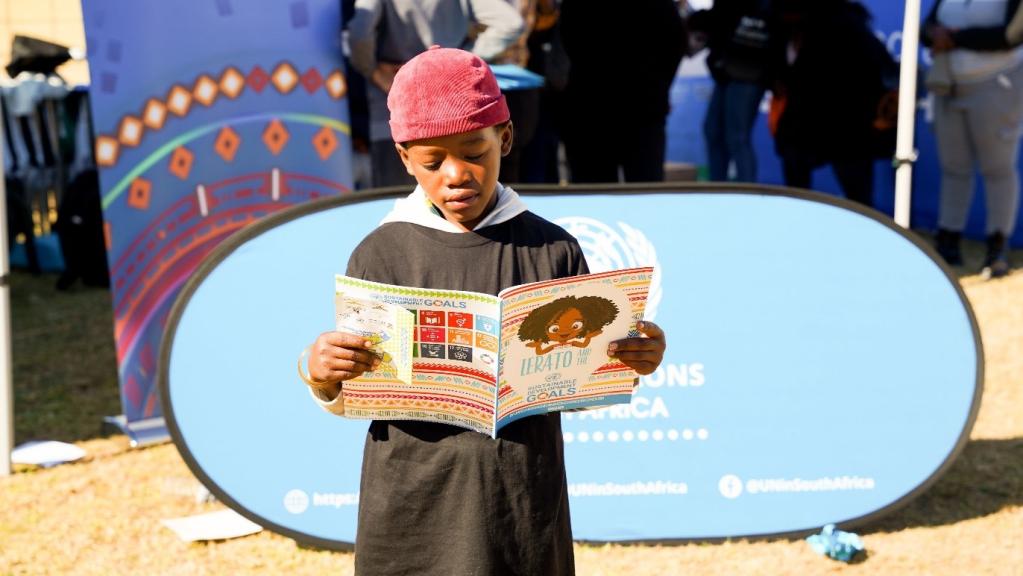
Story
06 June 2025
A slam dunk for the youth month
In a thrilling fusion of sport, purpose, and passion, the United Nations in South Africa joined forces with the Basketball Africa League (BAL) for its electrifying final at SunBet Arena at Time Square. This was not just to witness world-class athleticism, but to underscore the powerful role of sports in driving sustainable development and social change.The UN in South Africa, through its partnership with BAL and commitment to promoting sports for development, made a powerful and inclusive impact by donating 1,000 tickets to schoolchildren and youth from diverse communities, including aspiring young athletes from basketball associations across Gauteng Province. These tickets were far more than passes to a game; they were gateways to inspiration, inclusion, and possibility. For many, stepping into the atmosphere of the prestigious SunBet Arena was a first, a moment that transformed distant dreams into tangible experiences and offered a rare sense of belonging in a popular sporting environment.The UN Resident Coordinator and also head of the UN in South Africa, Nelson Muffuh, was present and actively took part in promoting the Substantiable Development Goals. His presence reinforced the message that the global goals are not just distant ideals, but tangible commitments that involve community engagement, collective participation and youth empowerment. Adding to the significance of the occasion was the presence of UN Children’s Fund (UNICEF) volunteers, who graciously joined the outreach and offered on-the-ground support and engagement. Dressed in their recognizable blue, the volunteers were more than symbolic participants, they were actively involved in guiding youth and encouraging meaningful conversation. Over the course of two unforgettable days, from 6 to 7 June, the SunBet Arena pulsed with energy, purpose, and possibility. The event was a bold call to action, urging young people to recognize their own potential as drivers of change, while also challenging broader society to invest in inclusive, transformative experiences that reach those often left behind. I’ve witnessed firsthand how sports like basketball can transform lives and communities. That’s why I urge the United Nations to invest in sports capacity building programs, such as the Junior NBA, to harness the full potential of athletics as a tool for global development. Basketball is more than a game, it is a vehicle for change. Though underrated in some regions, the success of initiatives like the Basketball Africa League (BAL) proves its power to unite people across borders, cultures, and backgrounds. - Joseph Kazembe Former Vikings/ Jump Academy Player University of JohannesburgRooted in the spirit and values of the 17 SDGs, the initiative stood as a compelling example of how partnerships, purposeful outreach, and the universal language of sport can break down barriers, uplift communities, and help shape a more just, equal, and sustainable future for all.Through this sports initiative, the UN amplified key SDGs that included: good health and well-being, which promotes mental, physical, and emotional health through sport; quality education which engages schools and encourages life-long learning beyond traditional classrooms.; reduced inequalities by making global events accessible to under-represented communities; and partnerships through collaboration with BAL, UNICEF, and local youth networks.
1 of 5

Press Release
01 July 2025
African Girls Can Code Initiative empowers young women with skills for a changing world
Following three successful coding and robotics bootcamps in 2024 and 2023, the African Girls Can Code Initiative (AGCCI) returns in 2025 to empower Grade 11 girls. From 4–14 July, 100 high school learners from public schools in all nine provinces will gather in Johannesburg for hands-on training in coding, robotics, and artificial intelligence. This is in line with the theme for this National Youth Month: “Skills for the changing world – Empowering youth for meaningful economic participation”. In South Africa, AGCCI is implemented through a partnership between UN Women South Africa Multi-Country Office, the Department of Basic Education, with support from Siemens and the Belgian government.Despite making up over half of all university graduates worldwide, women remain underrepresented in STEM(Science, Technology, Engineering and Mathematics) fields, accounting for only 35% of STEM graduates globally and about 30% of researchers in Sub-Saharan Africa, according to the UN Women and United Nations Department of Economic and Social Affairs Gender Snapshot 2024. Research reveals that in South Africa, less than one-third of female tertiary students graduate from STEM programs, and only 13% of digital-related graduates are women. The STEM gender gap starts early, with fewer girls choosing these subjects. Although more girls than boys wrote Grade 12 maths and physical science exams in 2021, boys outperformed them. This persistent educational gap limits girls’ career opportunities and contributes to poverty, inequality, and unemployment in South Africa.“Achieving gender equality demands that every young woman and girl be equipped with the right tools and have an equal chance at seizing the opportunities presented by digital advancement. African Girls Can Code Initiative has moved our efforts from just talking about bringing more women to the forefront of STEM to taking impactful steps to make it a reality, and it will only get better,” said Aleta Miller, UN Women Representative, South Africa Multi-Country Office.The 2025 bootcamp for high school girls programme will build on the South African Ministry of Basic Education’s new Coding and Robotics Curriculum to equip Grade 11 girls with essential digital skills. This year’s theme, Youth for Global Progress: Uniting for Solidarity, Championing Equality, Driving Sustainability, emphasises preparing young women to think critically, solve problems, and thrive creatively in a rapidly evolving digital world. Participants will engage in hands-on coding, robotics, and digital literacy activities designed to boost their confidence and open pathways into STEM careers. In June 2024, the South African AGCCI cohort expanded to include young women in TVETs, equipping them with digital and business skills. They learned coding, e-commerce, digital currencies, and how to use online platforms to launch and grow their own businesses. Many walked away not only with new skills, but with renewed confidence in their potential to lead, innovate, and create change in their communities and beyond. The impact is already evident:Victoria Phago’s perspective on IT careers changed when she joined AGCCI. “The programme revealed a fuller range of IT opportunities. I used to think IT was only about being a programmer or software developer, but now I see I can be innovative, design my own things, and even become an entrepreneur,” she said. Victoria is an Information Communication Technology (ICT) student at Tshwane North TVET College who was part of the AGGCI TVET coding camp in 2024.“Being part of the African Girls Can Code Initiative (AGCCI) was a turning point for me. AGCCI not only introduced me to the world of technology but also empowered me to take control of my future. Through this initiative, I realised the vast potential of technology in shaping our world and decided to pivot my career goals towards cybersecurity and information technology,” Bianca Moraka, AGGCI alumna.The AGCCI programme introduces students to computer science and next-generation technologies, user interface/user experience, website development, mobile applications development, robotics, and programming. The young participants also learn about gender equality and women's empowerment and what inclusion in the ICT sector will mean for progress and diversity.About African Girls Can Code Initiative In response to the growing need for inclusion in STEM and gender equality across the African continent, UN Women and the African Union Commission (AUC), in partnership with the International Telecommunication Union (ITU), launched the African Girls Can Code Initiative (AGCCI) in 2018.The programme aims to train and empower a minimum of 2000 girls aged 17 to 25 across Africa to become computer programmers, creators, and designers and more. The South African cohort is part of a larger group of girls on the continent who have received similar training in Kenya, Rwanda, Uganda, Tanzania,Mozambique, Burundi, Mali, Niger, DRC, and Senegal. and more.About UN Women UN Women is the global champion for gender equality, working to develop and uphold standards and create an environment in which every woman and girl can exercise her human rights and live up to her full potential. We are trusted partners for advocates and decision-makers from all walks of life and a leader in the effort to achieve gender equality. To learn more about UN Women’s work on the African continent: https://africa.unwomen.org/en.To attend the graduation on 11 July 2025, to cover one of the coding camp days in Johannesburg, or for media interviews, please contact: Maphuti Mahlaba Communications Analyst – UN Women South Africa Multi-Country Office maphuti.mahlaba@unwomen.org +27 65 742 4459
1 of 5
Press Release
13 June 2025
United Nations in South Africa Expresses Solidarity and Condolences in Wake of Eastern Cape Floods
Pretoria, 13 June 2025 – The United Nations in South Africa expresses its heartfelt condolences to the families and communities affected by the devastating floods that have swept across parts of the Eastern Cape, tragically claiming many lives, destroying schools and displacing hundreds. On behalf of the United Nations Country Team, the UN Resident Coordinator, Mr. Nelson Muffuh, extends deepest sympathies to all those mourning loved ones and commends the tireless efforts of national and local authorities, emergency responders, and community volunteers who are working around the clock to support those in need.“This is a time of immense sorrow for many families in the Eastern Cape,” said Mr. Muffuh. “We are deeply saddened by the tragic loss of life and the suffering caused by the floods. We stand in solidarity with the people of South Africa during this difficult time and are prepared to support the government’s response and recovery efforts in any way we can.”The United Nations continues to monitor the situation closely through its agencies and partners and remains in contact with the relevant national and provincial authorities to explore areas where support may be needed. As the country confronts this natural disaster, particular attention must be given to the needs of the most vulnerable, including children, the elderly, and persons with disabilities, who are often disproportionately affected during emergencies.“These floods are a stark reminder of the growing impact of climate change and the importance of strengthening disaster risk reduction, early warning systems, anticipatory actions, and climate resilience at all levels,” Mr. Muffuh added.The United Nations reaffirms its commitment to working hand-in-hand with the Government of South Africa, civil society, and development partners to support inclusive and sustainable recovery, with dignity and compassion at the center of our collective response.For media inquiries, please contact: Ziyanda Ngoma, Development Coordination and Partnership Officer, ziyanda.ngoma@un.org
1 of 5
Press Release
30 May 2025
South Africa, UN trade agency to host first-ever ministerial for small businesses
(Pretoria/Geneva) – The role of small businesses in international trade is set to take centre stage at the first-ever Global Small and Medium-sized Enterprises (SME) Ministerial Meeting, with more than 50 ministers convening in Johannesburg to align on actions to prioritize small business-led development, as announced by the South African government and the UN small business agency. The Ministerial, to be co-hosted by the South African Department of Small Business Development (DSBD) and the Geneva-based International Trade Centre (ITC), will take place on 22-24 July 2025. Ministers, business leaders and members of the media, register for the Global SME Ministerial Meeting here.At a press conference announcing the countdown to the Ministerial, DSBD Minister Stella Tembisa Ndabeni said: ‘We do not want a talk-shop. We will emerge with practical initiatives that strengthen the global MSME support ecosystem, as well as country-level partnerships that translate policy into action. Thus, I passionately urge governments, international agencies, development partners and the private sector to join us in strengthening MSME ecosystems.’ ITC Executive Director Pamela Coke-Hamilton said: ‘Small businesses form the foundation of trade, so their ability to navigate and benefit from this changing landscape is key. For change to happen at that level, the small business agenda also has to be a political one. That’s why we’re raising the political importance of the SME agenda at the global level, through this Ministerial.’ The UN Resident Coordinator in South Africa, Nelson Muffuh, said: ‘The upcoming Ministerial Meeting is a call for global solidarity and multilateral dialogue, one that ensures that no business is left behind in the race for digital transformation or just energy transitions, and to craft a bold, coordinated roadmap that puts SMEs at the centre of sustainable development. As we look toward July, the UN Country Team in South Africa stands ready to support this vision through policy coherence, technical cooperation and inclusive partnerships.’ At the Ministerial, ministers will endorse a call to action aimed at addressing three critical challenges confronting small businesses: limited access to finance, inadequate digital connectivity, and the complexities of transitioning to a green economy. Discussions will result in recommendations in these areas, which will feed into upcoming high-level global economic forums, including the G20 Leaders’ Summit in November 2025 and the World Trade Organization’s Ministerial Conference in March 2026. The Global SME Ministerial Meeting aims to elevate the political visibility of the small business agenda by providing a platform for countries to discuss and shape economic policies in the sector, reflecting the pain points and perspectives of small businesses. Countries that have confirmed interest in participating include Brazil, Cambodia, Costa Rica, Egypt, Ethiopia, India, Kenya, Nigeria, Switzerland and the United Arab Emirates. The Ministerial, taking on the theme of “Navigating New Business Frontiers”, comes at a time of major changes in global trade, from tariff-related policy shifts to emerging sustainability requirements. In this context, action by small businesses can drive change, in a non-disruptive way, as small businesses make up 90% of all companies and two-thirds of jobs worldwide. Small businesses, including those led by women and youth, play a particularly important role in the sustainable socioeconomic growth of developing countries. By pivoting from commodity extraction to value addition, investing in diversification of products and markets, and strengthening regional links to reduce dependency on a handful of countries, developing countries can take steps to stabilize the global trading system, at a time of uncertainty and instability. South Africa’s G20 presidency marks the first time the African continent hosts the intergovernmental forum, on the heels of the African Union becoming a permanent member, bringing together development and economic priorities. For further information, contact ITCMinisterial@intracen.orgNotes for the Editor About the Department of Small Business Development – The Department of Small Business Development is leading and coordinating an integrated approach to the promotion and development of entrepreneurship, micro, small and medium-sized enterprises, as well as cooperatives, to ensure an enabling legislative and policy environment to support their growth and sustainability. The Department provides financial and non-financial support to the MSMEs and cooperatives in South Africa. About the International Trade Centre - The International Trade Centre is the joint agency of the World Trade Organization and the United Nations. ITC assists small and medium-sized enterprises in developing and transition economies to become more competitive in global markets, thereby contributing to sustainable economic development within the frameworks of the Aid-for-Trade agenda and the United Nations’ Sustainable Development Goals.For more information, visit www.intracen.orgFollow ITC on X | Facebook | LinkedIn | Instagram | Flickr Media contacts Mr. Siphe Macanda
Head of Communications
Department of Small Business DevelopmentEmail: Media@dsbd.gov.za
Mobile: 082 355 2399
Facebook: https://www.facebook.com/DepartmentOfSmallBusinessDevelopment
X: @DSBD_SA
Website: https://www.dsbd.gov.za/ Ms. Susanna Pak
Senior Strategic Communications Officer
Office of the Executive Director
International Trade Centre
Email: pak@intracen.org
Head of Communications
Department of Small Business DevelopmentEmail: Media@dsbd.gov.za
Mobile: 082 355 2399
Facebook: https://www.facebook.com/DepartmentOfSmallBusinessDevelopment
X: @DSBD_SA
Website: https://www.dsbd.gov.za/ Ms. Susanna Pak
Senior Strategic Communications Officer
Office of the Executive Director
International Trade Centre
Email: pak@intracen.org
1 of 5
Press Release
25 May 2025
The UN in South Africa pays tribute to Gertrude Shope, icon of Social Justice and Gender Equality
Pretoria – It is with profound sadness that the United Nations in South Africa mourns the passing of Ms. Gertrude Shope, a formidable trade unionist, tireless advocate for women's rights, and a steadfast champion of social justice and liberation.“Ms. Shope’s unwavering commitment to the rights of workers, women and marginalised communities as well as her stellar contribution to the liberation struggle reflected the very essence of the UN’s values,” said Nelson Muffuh, the head of the UN in South Africa and its Resident Coordinator.“As we honour her legacy, we are reminded that the path to a just, inclusive, and equal society is built by courageous leaders like her. The UN family stands in solidarity with her family and the people of South Africa as we celebrate her contribution to the country’s freedom,” added Mr. Muffuh.Throughout her life, Ms. Shope exemplified the values of equality, dignity, and human rights for all. A courageous leader during South Africa’s struggle for liberation and democracy, her contributions extended far beyond political activism. She dedicated her life to uplifting workers, empowering women, and defending the rights of most vulnerable – efforts that echo the UN’s mission to build inclusive and just societies and leave no one behind.In her message of condolences, Aleta Miller, the Representative of the UN Women in South Africa, said: “We mourn the loss of Ms. Shope, a towering figure in the struggle for gender equality and social justice.”According to Ms. Miller, her life’s work laid the foundation for many of the rights and freedoms women in South Africa enjoy today. “She was not only a trailblazer in the fight against apartheid, but also for the principles now embodied in the Women Peace and Security (WPS) agenda. She championed women’s participation in peacebuilding, conflict resolution, and democratic governance. She was a fearless advocate for the empowerment of women in every sphere of life.Ms. Shope’s international activism during her years in exile helped elevate South Africa’s liberation cause on the global stage, aligning with UN-backed efforts to end apartheid and promote human rights. She built solidarities across borders, placing women’s voices and experiences at the centre of global peace and justice discourses decades before the Women, Peace and Security (WPS) agenda was formally adopted.Her leadership helped lay the groundwork for policies that now form part of the UN’s approach to inclusive peace and sustainable development. After South Africa's democratic transition, she continued to influence national development and gender policy, supporting programmes that targeted poverty, inequality, and education – pillars central to the Sustainable Development Goals (SDGs).For media enquiries please contact: Eunice Namugwe, UN Information Centre – Pretoria, Email: namugwe@un.org, Tel : +27 71 6828310.
1 of 5
Press Release
22 May 2025
Budget 2025: Implications for children
PRETORIA, 22 May 2025: The United Nations Children’s Fund (UNICEF) South Africa acknowledges the challenging circumstances under which the national budget was developed and the South African government’s commitment to find a balance between financial stability and ensuring the progressive realisation of children’s social and economic rights.UNICEF is pleased to note that overall expenditure is expected to grow by 1.2 per cent in real terms over the medium-term and that programmes that make a meaningful difference to the lives of children, particularly basic education, health, and social protection show marginal above-inflationary increases.UNICEF also welcomes the progress that has been made in providing basic services at the local government level. The reduction in the frequency of load-shedding has benefited the millions of children from under-served communities who use public clinics and after-school facilities, and electricity availability is vital for the functioning of both institutions.While the country’s fiscal room has diminished because of the aborted Value Added Tax (VAT) proposal, it is encouraging to note that spending on social grants has been maintained - notably the Child Support Grant and the Care Dependency Grant. Reasonable questions could be asked about the adequacy of these increases, especially in the context of a rising cost-of-living in the country.As a recently launched National Planning Commission (NPC) and UNICEF South Africa Study has shown, the prices of goods and services have increased by 95 per cent between 2011 and 2023. Hence some form of compensatory spending remains important to shield households and children that are exposed to rising costs. “We urgently need comprehensive, sustained, and integrated efforts to protect children’s well-being during periods of economic hardship. It is important that we safeguard the spending on children’s programmes, given the rising cost-of-living the country faces and the need to maintain spending on human capital” says Christine Muhigana, Country Representative of UNICEF South Africa.Ms. Muhigana acknowledged the efforts of Government, while emphasising that a clear and quantifiable statement on how much the country spends on children will help fully assess the implementation of children’s rights.While Budget 2025 contains encouraging news for children, UNICEF is concerned about specific funding challenges that may negatively impact child-focused services. Some of these include:The decision not to extend the food items that are exempted from the Value Added Tax will place more pressure on poor households to provide their families with adequate and nutritious food.Further uncertainty about the funding of the Social Relief of Distress (SRD) Grant, which is considered one of the stabilising factors in South Africa. In fact, the National Planning Commission and UNICEF South Africa’s “Trends in the cost of living” publication shows that the poorest households gained increases in per capita household income because of the introduction of the SRD grant. The decision to increase the fuel levy will have negative implications for households that spend a substantial part of their income on transport to access work and learning opportunities.It is also not clear whether improved infrastructure spending involves only economic infrastructure as opposed to social infrastructure, particularly clinics and schools.Given the multiple nature of the issues that children face, UNICEF has been calling for the establishment of an annual or bi-annual children’s budget. This would enable stakeholders to gauge the extent to which Government spends on critical interventions, including child protection as well as prevention and early intervention services.In view of the challenging context and recognising that investment in children’s programmes takes time to produce tangible results, UNICEF and social partners stand ready to assist the government in addressing the bottlenecks that impede effective service delivery for children.“South Africa has shown itself resilient and adaptable in addressing multiple crises and through our collective efforts and determination, we can build a more equitable and prosperous future for all children and their families,” notes Ms. Muhigana.###About UNICEF: UNICEF works in some of the world’s toughest places, to reach the world’s most disadvantaged children. Across 190 countries and territories, we work for every child, everywhere, to build a better world for everyone. For more information about UNICEF and its work for children visit www.unicef.org. Follow UNICEF on Twitter and FacebookFor more information, please contact: Sudeshan Reddy, Communications Specialist, UNICEF South Africa, Cell: + 27 82 5613970, sureddy@unicef.org
1 of 5
Latest Resources
1 / 11
Resources
27 March 2025
1 / 11

